Shows
 Keeping Up With The KeynesiansSupercars: Economics of the 1% (Young Economist Of The Year Entry)In this episode we explore the reasons, effects and insights behind the high prices of supercars. We discuss our thoughts behind everything from the world’s most expensive car, why Koenigsegg is apparently not so high-tech and how big brands rely on snobbery for success. Filled with lively debates, interesting insights and fun games.Host: Oliver HewesPanel: James Grubb, Angela Cao, Shikemi GaniyuEditors: Oliver Hewes, Beany YueProducer: Beany Yue2025-07-0209 min
Keeping Up With The KeynesiansSupercars: Economics of the 1% (Young Economist Of The Year Entry)In this episode we explore the reasons, effects and insights behind the high prices of supercars. We discuss our thoughts behind everything from the world’s most expensive car, why Koenigsegg is apparently not so high-tech and how big brands rely on snobbery for success. Filled with lively debates, interesting insights and fun games.Host: Oliver HewesPanel: James Grubb, Angela Cao, Shikemi GaniyuEditors: Oliver Hewes, Beany YueProducer: Beany Yue2025-07-0209 min Keeping Up With The KeynesiansThe Price of a Dying Planet: Climate Change, Nature and the Future EconomyIn this episode we explore the causes, consequences and details behind our warming planet, a vanishing wilderness and a shifting economy. We discuss our thoughts behind everything from flooding and house prices to avocados and Volkswagen Golfs. Filled with lively debates, interesting insights and fun games.Host: Oliver HewesPanel: Henry RoseffEditors: Oliver Hewes, Beany YueProducer: Beany Yue2025-06-1834 min
Keeping Up With The KeynesiansThe Price of a Dying Planet: Climate Change, Nature and the Future EconomyIn this episode we explore the causes, consequences and details behind our warming planet, a vanishing wilderness and a shifting economy. We discuss our thoughts behind everything from flooding and house prices to avocados and Volkswagen Golfs. Filled with lively debates, interesting insights and fun games.Host: Oliver HewesPanel: Henry RoseffEditors: Oliver Hewes, Beany YueProducer: Beany Yue2025-06-1834 min CypherPunk’dThe Big Print Series: "Bitcoin is God's Gift to Humanity" | Episode 8 of 12Welcome back to The Big Print Series! In this mind-blowing Episode 8, Lawrence Lepard delivers his most profound revelation yet: Bitcoin isn't just an investment—it's literally a "God-given tool" to save humanity from monetary tyranny. For the first time in human history, we have perfect, immutable digital scarcity that can never be diluted.
In this episode:• Why Bitcoin is a "once-in-humanity" event that will never happen again • The deflation "boogeyman": How Keynesians weaponized the Great Depression to serve elites • Warren Buffett exposed: Why he really hates Bitcoin (it makes his life's work meaningless) • The inverse Cantillon effect: How deflation...2025-06-181h 52
CypherPunk’dThe Big Print Series: "Bitcoin is God's Gift to Humanity" | Episode 8 of 12Welcome back to The Big Print Series! In this mind-blowing Episode 8, Lawrence Lepard delivers his most profound revelation yet: Bitcoin isn't just an investment—it's literally a "God-given tool" to save humanity from monetary tyranny. For the first time in human history, we have perfect, immutable digital scarcity that can never be diluted.
In this episode:• Why Bitcoin is a "once-in-humanity" event that will never happen again • The deflation "boogeyman": How Keynesians weaponized the Great Depression to serve elites • Warren Buffett exposed: Why he really hates Bitcoin (it makes his life's work meaningless) • The inverse Cantillon effect: How deflation...2025-06-181h 52 Keeping Up With The KeynesiansEpisode 8 - Room for Growth: Hospitality, Services & the UK’s Economic Future (ft. Jay Chan)In this episode we explore the economic successes, failures and future of Britain’s services and hospitality sector, joined by renowned internet hospitality expert Jay Chan. We discuss our thoughts on pubs, McDonald’s managers and Finance bros working on farms. Filed with lively debates, interesting insights and fun games.Host: Oliver HewesPanel: Isa Syed, Jay Chan (Guest)Editors: Oliver Hewes, Beany YueProducer: Beany Yue2025-06-0443 min
Keeping Up With The KeynesiansEpisode 8 - Room for Growth: Hospitality, Services & the UK’s Economic Future (ft. Jay Chan)In this episode we explore the economic successes, failures and future of Britain’s services and hospitality sector, joined by renowned internet hospitality expert Jay Chan. We discuss our thoughts on pubs, McDonald’s managers and Finance bros working on farms. Filed with lively debates, interesting insights and fun games.Host: Oliver HewesPanel: Isa Syed, Jay Chan (Guest)Editors: Oliver Hewes, Beany YueProducer: Beany Yue2025-06-0443 min Keeping Up With The KeynesiansEpisode 7 - Rise of the Machines: Will AI Reshape the Economy or Destroy JobsIn this episode we explore the economic impacts, social viability and sub-niches behind the rise of automation and AI. We discuss our thoughts on inequality, the opportunities of AI and the possible risks alongside it. Filled with lively debates, interesting insights and fun games.Host: Oliver HewesPanel: James Hilton, Isa SyedEditors: Oliver Hewes, Beany YueProducer: Beany Yue2025-05-2123 min
Keeping Up With The KeynesiansEpisode 7 - Rise of the Machines: Will AI Reshape the Economy or Destroy JobsIn this episode we explore the economic impacts, social viability and sub-niches behind the rise of automation and AI. We discuss our thoughts on inequality, the opportunities of AI and the possible risks alongside it. Filled with lively debates, interesting insights and fun games.Host: Oliver HewesPanel: James Hilton, Isa SyedEditors: Oliver Hewes, Beany YueProducer: Beany Yue2025-05-2123 min Keeping Up With The KeynesiansEpisode 6 - Trade Wars: The True Cost of Trump’s Tariffs (ft. The Conversation Cabinet)In this episode we explore the economic effects, political chaos and other niches behind Trump’s tariff policies. We discuss thoughts on stagflation, supply chain disruption and why Pirates should apply for jobs at Goldman Sachs!!! Filled with lively debates, interesting insights and fun games.Host: Oliver HewesPanel: James Hilton, Joshua Eames (Guest)Editors: Oliver Hewes, Beany YueProducer: Beany Yue2025-05-0720 min
Keeping Up With The KeynesiansEpisode 6 - Trade Wars: The True Cost of Trump’s Tariffs (ft. The Conversation Cabinet)In this episode we explore the economic effects, political chaos and other niches behind Trump’s tariff policies. We discuss thoughts on stagflation, supply chain disruption and why Pirates should apply for jobs at Goldman Sachs!!! Filled with lively debates, interesting insights and fun games.Host: Oliver HewesPanel: James Hilton, Joshua Eames (Guest)Editors: Oliver Hewes, Beany YueProducer: Beany Yue2025-05-0720 min Reset Your Thinking PodcastBook: Management Economics and SocietyThis briefing document summarizes the main themes and important ideas presented in the provided excerpts from Peter F. Drucker's "Peter F. Drucker on Nonprofits and the Public Sector" and selected essays. The essays span from 1972 to 1981, offering insights into economics, technology, management, and the unique characteristics of Japan.
Part 1: The Next Economics
Main Theme: Drucker argues that economics is undergoing its fifth "scientific revolution," moving beyond the dominant Keynesian paradigm to a "Next Economics" that will grapple with the interplay of micro and macro economies, the role of the nation-state in a globalized world, and the integration...2025-04-0732 min
Reset Your Thinking PodcastBook: Management Economics and SocietyThis briefing document summarizes the main themes and important ideas presented in the provided excerpts from Peter F. Drucker's "Peter F. Drucker on Nonprofits and the Public Sector" and selected essays. The essays span from 1972 to 1981, offering insights into economics, technology, management, and the unique characteristics of Japan.
Part 1: The Next Economics
Main Theme: Drucker argues that economics is undergoing its fifth "scientific revolution," moving beyond the dominant Keynesian paradigm to a "Next Economics" that will grapple with the interplay of micro and macro economies, the role of the nation-state in a globalized world, and the integration...2025-04-0732 min Keeping Up With The KeynesiansEpisode 5 - Open Borders vs Closed Doors: The Economic Case for ImmigrationIn this episode we dive into the economic impact of immigration on the UK and whether we should open our borders or close our doors. Filled with lively debate, fun games and interesting perspectives.Host: Oliver HewesPanel: Nathan Van Blerk, Fynn RatcliffeEditors: Oliver Hewes, Beany YueProducer: Beany Yue2025-04-0227 min
Keeping Up With The KeynesiansEpisode 5 - Open Borders vs Closed Doors: The Economic Case for ImmigrationIn this episode we dive into the economic impact of immigration on the UK and whether we should open our borders or close our doors. Filled with lively debate, fun games and interesting perspectives.Host: Oliver HewesPanel: Nathan Van Blerk, Fynn RatcliffeEditors: Oliver Hewes, Beany YueProducer: Beany Yue2025-04-0227 min Keeping Up With The KeynesiansEpisode 4 - YT Audio - The UK’s Supply Side Revolution (ft. Adam Smith’s Apprentices)In this episode we are joined by fellow student podcasters at Adam Smith’s apprentices to discuss all things supply side policies in the UK. Filled with lively debate, fun games and interesting perspectives.Host: Oliver HewesPanel: James Hilton, Elliot Guy, Freddie Blackburn, Will Hodges, Oscar FoxEditors: Oliver Hewes, Beany YueProducer: Beany Yue2025-03-2615 min
Keeping Up With The KeynesiansEpisode 4 - YT Audio - The UK’s Supply Side Revolution (ft. Adam Smith’s Apprentices)In this episode we are joined by fellow student podcasters at Adam Smith’s apprentices to discuss all things supply side policies in the UK. Filled with lively debate, fun games and interesting perspectives.Host: Oliver HewesPanel: James Hilton, Elliot Guy, Freddie Blackburn, Will Hodges, Oscar FoxEditors: Oliver Hewes, Beany YueProducer: Beany Yue2025-03-2615 min Keeping Up With The KeynesiansEpisode 3 - The Next Big Crash: Is The Stock Market A Ticking Time BombIn this episode we dive into stock market crashes and what signs could indicate the next big crash. Filled with lively debate, fun games and interesting perspectives.Host: Oliver HewesPanel: Elliot Guy, Alfie GeorgeEditors: Oliver Hewes, Beany YueProducer: Beany Yue2025-03-1917 min
Keeping Up With The KeynesiansEpisode 3 - The Next Big Crash: Is The Stock Market A Ticking Time BombIn this episode we dive into stock market crashes and what signs could indicate the next big crash. Filled with lively debate, fun games and interesting perspectives.Host: Oliver HewesPanel: Elliot Guy, Alfie GeorgeEditors: Oliver Hewes, Beany YueProducer: Beany Yue2025-03-1917 min Keeping Up With The KeynesiansEpisode 2 - The Price Is Right: Inflation TargettingIn this episode, we learn about the roots of inflation targeting, why we choose 2%, and whether another rate is more appropriate? Filled with lively debates, fun games, and interesting facts.Host: Oliver HewesPanel: James Hilton, Ross GalwayEditors: Beany Yue, Oliver HewesProducer: Beany Yue2025-03-0814 min
Keeping Up With The KeynesiansEpisode 2 - The Price Is Right: Inflation TargettingIn this episode, we learn about the roots of inflation targeting, why we choose 2%, and whether another rate is more appropriate? Filled with lively debates, fun games, and interesting facts.Host: Oliver HewesPanel: James Hilton, Ross GalwayEditors: Beany Yue, Oliver HewesProducer: Beany Yue2025-03-0814 min Keeping Up With The KeynesiansEpisode 1 - Keynes: The Economist Who Changed the WorldIn this episode, we explore the life, theories and perspectives of John Maynard Keynes, the man who revolutionised economics with ideas that still shape policy today. We discuss thoughts on government intervention, debates on whether his policies would work today and whether his past choices were the right ones. Host: Oliver HewesPanel: Elliot Guy, James HiltonEditors: Oliver Hewes, Beany YueProducer: Beany Yue2025-03-0114 min
Keeping Up With The KeynesiansEpisode 1 - Keynes: The Economist Who Changed the WorldIn this episode, we explore the life, theories and perspectives of John Maynard Keynes, the man who revolutionised economics with ideas that still shape policy today. We discuss thoughts on government intervention, debates on whether his policies would work today and whether his past choices were the right ones. Host: Oliver HewesPanel: Elliot Guy, James HiltonEditors: Oliver Hewes, Beany YueProducer: Beany Yue2025-03-0114 min InFi: the Future of FinanceEp. 57: Crash Course in Different Business Cycle TheoriesMurphy sketches the strengths and weaknesses of the various explanations of the business cycle, put forth by the classical economists, the Keynesians, the Real Business Cycle theorists, the Post-Keynesians, and the Austrians. Related Links: - https://mises.org/podcasts/human-action-podcast/what-does-says-law-really-say - https://www.youtube.com/watch?v=envGgTVOL_4 Watch the video version of this episode here: https://www.youtube.com/watch?v=CiPh3jMF-z0 Subscribe to our YouTube channel: https://bit.ly/3XXfmGS Follow us on Instagram: https://www.instagram.com/infineogroup/ Follow us on Twitter: https...2024-10-1157 min
InFi: the Future of FinanceEp. 57: Crash Course in Different Business Cycle TheoriesMurphy sketches the strengths and weaknesses of the various explanations of the business cycle, put forth by the classical economists, the Keynesians, the Real Business Cycle theorists, the Post-Keynesians, and the Austrians. Related Links: - https://mises.org/podcasts/human-action-podcast/what-does-says-law-really-say - https://www.youtube.com/watch?v=envGgTVOL_4 Watch the video version of this episode here: https://www.youtube.com/watch?v=CiPh3jMF-z0 Subscribe to our YouTube channel: https://bit.ly/3XXfmGS Follow us on Instagram: https://www.instagram.com/infineogroup/ Follow us on Twitter: https...2024-10-1157 min Origin StoryJohn Maynard Keynes Part Two: We’re all Keynesians nowIn Part Two of John Maynard Keynes, Dorian Lynskey and Ian Dunt reconnect with Keynes in the 1930s, as he slowly pulls together his magnum opus, The General Theory of Employment, Interest and Money. This book changed everything for Keynes, and the rest of us, by establishing Keynesianism as a new way to understand both the economy and society. Ian and Dorian discuss the last decade of Keynes’ life, from the New Deal to the Second World War to the Bretton Woods conference which established the post-war order. When Keynes died suddenly in 1946, his ardent disciples had just begun re...2023-11-131h 05
Origin StoryJohn Maynard Keynes Part Two: We’re all Keynesians nowIn Part Two of John Maynard Keynes, Dorian Lynskey and Ian Dunt reconnect with Keynes in the 1930s, as he slowly pulls together his magnum opus, The General Theory of Employment, Interest and Money. This book changed everything for Keynes, and the rest of us, by establishing Keynesianism as a new way to understand both the economy and society. Ian and Dorian discuss the last decade of Keynes’ life, from the New Deal to the Second World War to the Bretton Woods conference which established the post-war order. When Keynes died suddenly in 1946, his ardent disciples had just begun re...2023-11-131h 05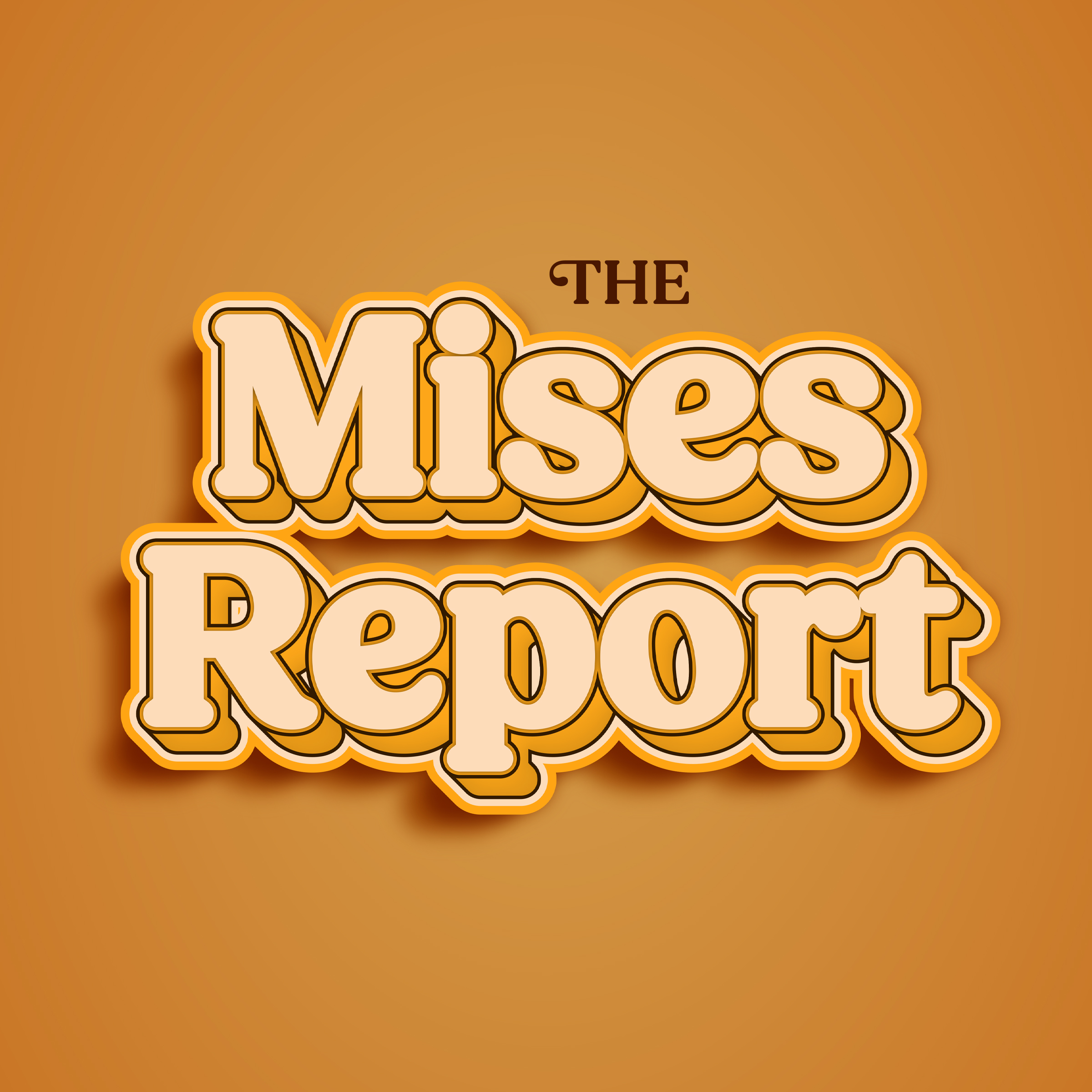 The Mises ReportMyth #6: There Is a Tradeoff between Unemployment and InflationRecorded by the Mises Institute in the mid-1980s, The Mises Report provided radio commentary from leading non-interventionists, economists, and political scientists. In this program, we present another part of "Ten Great Economic Myths". This material was prepared by Murray N. Rothbard.
Every time someone calls for the government to abandon its inflationary policies, Establishment economists and politicians warn that the result can only be severe unemployment. We are trapped, therefore, into playing off inflation against high unemployment, and become persuaded that we must therefore accept some of both.
This doctrine is the fallback position...2023-07-1000 min
The Mises ReportMyth #6: There Is a Tradeoff between Unemployment and InflationRecorded by the Mises Institute in the mid-1980s, The Mises Report provided radio commentary from leading non-interventionists, economists, and political scientists. In this program, we present another part of "Ten Great Economic Myths". This material was prepared by Murray N. Rothbard.
Every time someone calls for the government to abandon its inflationary policies, Establishment economists and politicians warn that the result can only be severe unemployment. We are trapped, therefore, into playing off inflation against high unemployment, and become persuaded that we must therefore accept some of both.
This doctrine is the fallback position...2023-07-1000 min The Mises ReportMyth #6: There Is a Tradeoff between Unemployment and InflationRecorded by the Mises Institute in the mid-1980s, The Mises Report provided radio commentary from leading non-interventionists, economists, and political scientists. In this program, we present another part of "Ten Great Economic Myths". This material was prepared by Murray N. Rothbard.
Every time someone calls for the government to abandon its inflationary policies, Establishment economists and politicians warn that the result can only be severe unemployment. We are trapped, therefore, into playing off inflation against high unemployment, and become persuaded that we must therefore accept some of both.
This doctrine is the fallback position...2023-07-1000 min
The Mises ReportMyth #6: There Is a Tradeoff between Unemployment and InflationRecorded by the Mises Institute in the mid-1980s, The Mises Report provided radio commentary from leading non-interventionists, economists, and political scientists. In this program, we present another part of "Ten Great Economic Myths". This material was prepared by Murray N. Rothbard.
Every time someone calls for the government to abandon its inflationary policies, Establishment economists and politicians warn that the result can only be severe unemployment. We are trapped, therefore, into playing off inflation against high unemployment, and become persuaded that we must therefore accept some of both.
This doctrine is the fallback position...2023-07-1000 min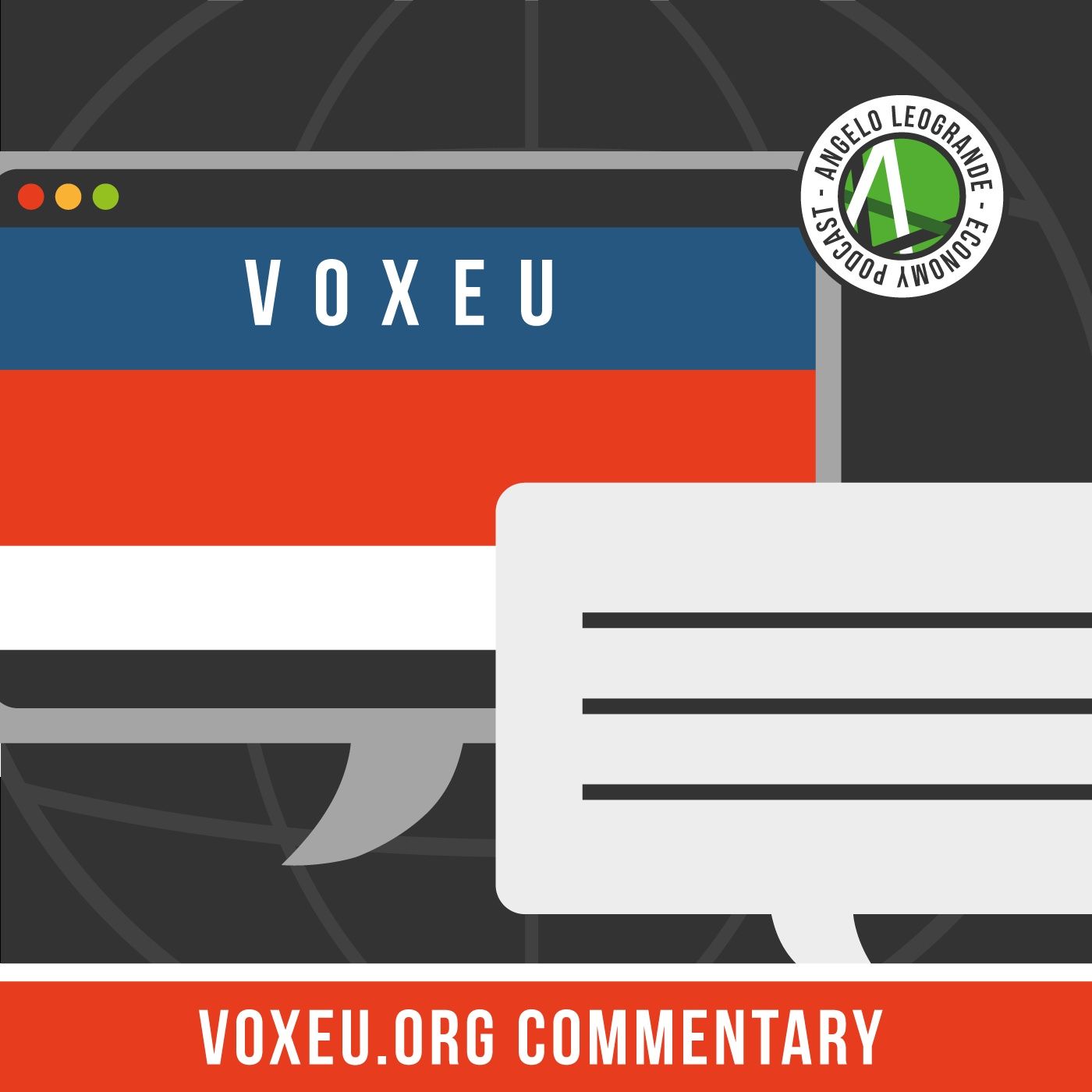 Voxeu.org commentaryAngelo Leogrande-Una Nuova Modellistica MacroeconomicaAnalisi dell'articolo intitolato "The distinction between Keynesians and Monetarists is obsolete" di Coen N. Teulings / 26 May 2023. LInk: https://cepr.org/voxeu/columns/distinction-between-keynesians-and-monetarists-obsoleteAbbiamo bisogno di nuovi modelli macro-economici che mettano insieme le seguenti variabili: *Elevati livelli di debito pubblico in tutti i paesi occidentali compresi Germania, UK e USA; *Persistenza dell'inflazione nella crescita dei tassi di interesse; *Riduzione dei livelli del commercio internazionale;*Riduzione del tasso di innovazione tecnologica indotta dalla crescita del tasso di interesse;*Bassa crescita economicaBecome a supporter of this podcast: https://www.spreaker...2023-05-2727 min
Voxeu.org commentaryAngelo Leogrande-Una Nuova Modellistica MacroeconomicaAnalisi dell'articolo intitolato "The distinction between Keynesians and Monetarists is obsolete" di Coen N. Teulings / 26 May 2023. LInk: https://cepr.org/voxeu/columns/distinction-between-keynesians-and-monetarists-obsoleteAbbiamo bisogno di nuovi modelli macro-economici che mettano insieme le seguenti variabili: *Elevati livelli di debito pubblico in tutti i paesi occidentali compresi Germania, UK e USA; *Persistenza dell'inflazione nella crescita dei tassi di interesse; *Riduzione dei livelli del commercio internazionale;*Riduzione del tasso di innovazione tecnologica indotta dalla crescita del tasso di interesse;*Bassa crescita economicaBecome a supporter of this podcast: https://www.spreaker...2023-05-2727 min Natural Order PodcastMethodology matters ... & the other guys are doing it wrong Austrian Economics Hosts Brian O’Leary and Adam Haman discuss Austrian Economics, another one of the “four pillars” holding up the Natural Order Podcast. Why is the Austrian School right? And where do the Keynesians, Neo-classicists, Monetarists, and calculus-worshiping wonks go wrong. Today’s show brought to you by Liberty Classroom Austrian Economics: Methodology matters, and the other guys are doing it wrong. “The curious task… …of economics is to demonstrate to men how little they really know about what they imagine they can design. To the naive mind that can conceive of order only as the prod...2023-04-2527 min
Natural Order PodcastMethodology matters ... & the other guys are doing it wrong Austrian Economics Hosts Brian O’Leary and Adam Haman discuss Austrian Economics, another one of the “four pillars” holding up the Natural Order Podcast. Why is the Austrian School right? And where do the Keynesians, Neo-classicists, Monetarists, and calculus-worshiping wonks go wrong. Today’s show brought to you by Liberty Classroom Austrian Economics: Methodology matters, and the other guys are doing it wrong. “The curious task… …of economics is to demonstrate to men how little they really know about what they imagine they can design. To the naive mind that can conceive of order only as the prod...2023-04-2527 min Simply Bitcoin: Wake Up CallWhy We Should Abolish the IRS and End the FEDThe House of Representatives are set to vote to abolish the IRS and the income tax, are the Keynesians days numbered? Check out this episode to find out why we should abolish the IRS and the income tax as well as End the Fed.
Check it out!
There is no second best.
✓ SUBSCRIBE - https://bit.ly/3QbgqTQ
✓ LEAVE A LIKE
✓ COMMENT
Join our Telegram, Give us Memes to Review! ► https://t.me/TheSimplyBitcoinChannel
Sauces
► https://www.foxnews.com/politics/house-republicans-vote-bill-abolishing-irs-eliminating-income-tax
► https://www.dai...2023-02-0912 min
Simply Bitcoin: Wake Up CallWhy We Should Abolish the IRS and End the FEDThe House of Representatives are set to vote to abolish the IRS and the income tax, are the Keynesians days numbered? Check out this episode to find out why we should abolish the IRS and the income tax as well as End the Fed.
Check it out!
There is no second best.
✓ SUBSCRIBE - https://bit.ly/3QbgqTQ
✓ LEAVE A LIKE
✓ COMMENT
Join our Telegram, Give us Memes to Review! ► https://t.me/TheSimplyBitcoinChannel
Sauces
► https://www.foxnews.com/politics/house-republicans-vote-bill-abolishing-irs-eliminating-income-tax
► https://www.dai...2023-02-0912 min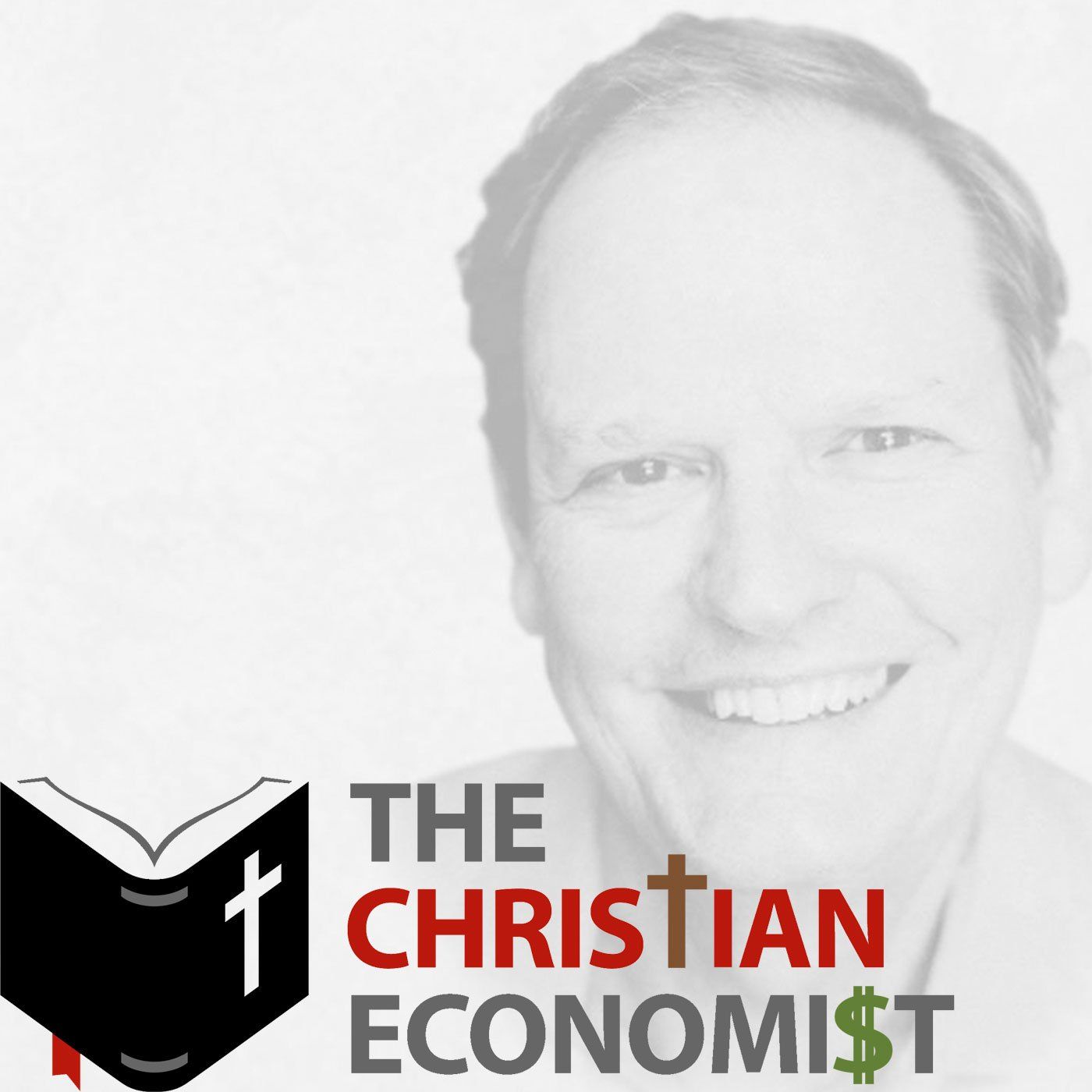 The Christian Economist by Dave Arnott#148 It is Better to Supply than to Demand#148 It is Better to Supply than to Demand We used to get our identity from what we supplied, now we get our identity from what we demand. Christians should get their identity from being made in the image of God. Your Name What’s your name? Even more interesting, what’s it mean? That is the beginning of an interesting exercise in class at Dallas Baptist University. If it's Mill, like the philosopher John Stuart Mill, someone in your lineage ran the mill. If it’s Smith, like that guy, Adam Smith, someone was a black smith or ti...2022-11-1711 min
The Christian Economist by Dave Arnott#148 It is Better to Supply than to Demand#148 It is Better to Supply than to Demand We used to get our identity from what we supplied, now we get our identity from what we demand. Christians should get their identity from being made in the image of God. Your Name What’s your name? Even more interesting, what’s it mean? That is the beginning of an interesting exercise in class at Dallas Baptist University. If it's Mill, like the philosopher John Stuart Mill, someone in your lineage ran the mill. If it’s Smith, like that guy, Adam Smith, someone was a black smith or ti...2022-11-1711 min New Books in FinanceBinyamin Appelbaum, "The Economists' Hour: False Prophets, Free Markets, and the Fracture of Society" (Little Brown, 2019)Think economics is the "dismal science" with abstract formulas that have no impact on life as it is actually lived? Think again. In The Economists' Hour: False Prophets, Free Markets, and the Fracture of Society (Little Brown, 2019), Binyamin Appelbaum--former correspondent and now an editorial board member of the New York Times--brings to life how academic economists rose "from the basement" of banks and universities in the post-war period to have a direct impact on almost every aspect of our lives. The end of the draft, unemployment levels, inflation, deregulation, air transport, phone service, patent law, monopolies and anti-trust activity, e...2022-09-2240 min
New Books in FinanceBinyamin Appelbaum, "The Economists' Hour: False Prophets, Free Markets, and the Fracture of Society" (Little Brown, 2019)Think economics is the "dismal science" with abstract formulas that have no impact on life as it is actually lived? Think again. In The Economists' Hour: False Prophets, Free Markets, and the Fracture of Society (Little Brown, 2019), Binyamin Appelbaum--former correspondent and now an editorial board member of the New York Times--brings to life how academic economists rose "from the basement" of banks and universities in the post-war period to have a direct impact on almost every aspect of our lives. The end of the draft, unemployment levels, inflation, deregulation, air transport, phone service, patent law, monopolies and anti-trust activity, e...2022-09-2240 min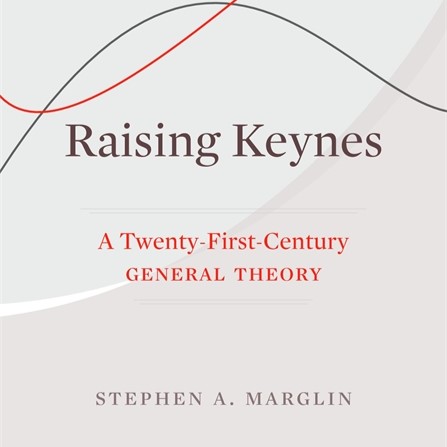 PhilosophyPodcasts.OrgKeynes (economics) Stephen A. Marglin (Harvard) Raising Keynes: A twenty-first-century general theory Back to the future: a heterodox economist rewrites Keynes’s General Theory of Employment, Interest, and Money to serve as the basis for a macroeconomics for the twenty-first century. John Maynard Keynes’s General Theory of Employment, Interest, and Money was the most influential economic idea of the twentieth century. But, argues Stephen Marglin, its radical implications were obscured by Keynes’s lack of the mathematical tools necessary to argue convincingly that the problem was the market itself, as distinct from myriad sources of friction around its margins...2022-08-3043 min
PhilosophyPodcasts.OrgKeynes (economics) Stephen A. Marglin (Harvard) Raising Keynes: A twenty-first-century general theory Back to the future: a heterodox economist rewrites Keynes’s General Theory of Employment, Interest, and Money to serve as the basis for a macroeconomics for the twenty-first century. John Maynard Keynes’s General Theory of Employment, Interest, and Money was the most influential economic idea of the twentieth century. But, argues Stephen Marglin, its radical implications were obscured by Keynes’s lack of the mathematical tools necessary to argue convincingly that the problem was the market itself, as distinct from myriad sources of friction around its margins...2022-08-3043 min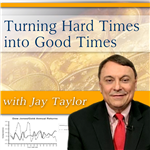 Turning Hard Times into Good TimesCentral Bank Gold Price Rigging Is No ConspiracyChris Powell, Dr. Quinton Hennigh and Michael Oliver return. On August 15, 1971 President Nixon detached gold from the world’s monetary system and declared “We are all Keynesians now.” By so doing he set the stage for massive amounts of inflation not only in consumer prices but in stock and bond prices that served to siphon wealth from the middle class to the billionaire class to an extent even greater than the Robber Baron period of the 1920s. To con the world into using an intrinsically worthless dollar after 1971, the Nixon administration used the U.S. military to protect the power of the...2022-07-1955 min
Turning Hard Times into Good TimesCentral Bank Gold Price Rigging Is No ConspiracyChris Powell, Dr. Quinton Hennigh and Michael Oliver return. On August 15, 1971 President Nixon detached gold from the world’s monetary system and declared “We are all Keynesians now.” By so doing he set the stage for massive amounts of inflation not only in consumer prices but in stock and bond prices that served to siphon wealth from the middle class to the billionaire class to an extent even greater than the Robber Baron period of the 1920s. To con the world into using an intrinsically worthless dollar after 1971, the Nixon administration used the U.S. military to protect the power of the...2022-07-1955 min The Shane Hazel Show215. Surprise!!! We Predicted The Fed & InflationWhile the Fed aka the banking cabal, media, crypto bros and keynesians freak out about the implosion of the dollar, I am here to guide you through what Austrian economists and Bitcoiners have told you all along. The $ is dying and so with hopefully tyranny, if people will choose a free medium of exchange in this episode of Radical!
https://tinyurl.com/yezfk3k7
Follow Shane - @ShaneTHazel Youtube, Apple Podcasts, Spotify
Support Shane on Patreon
Radical Home Page
2022-06-1437 min
The Shane Hazel Show215. Surprise!!! We Predicted The Fed & InflationWhile the Fed aka the banking cabal, media, crypto bros and keynesians freak out about the implosion of the dollar, I am here to guide you through what Austrian economists and Bitcoiners have told you all along. The $ is dying and so with hopefully tyranny, if people will choose a free medium of exchange in this episode of Radical!
https://tinyurl.com/yezfk3k7
Follow Shane - @ShaneTHazel Youtube, Apple Podcasts, Spotify
Support Shane on Patreon
Radical Home Page
2022-06-1437 min The Human Action PodcastInflation Then vs Now: Follow The MoneyToday, inflation and prices are soaring. We know that Federal Reserve monetary policy is the cause. But why didn't something similar happen after the 2008 financial crash?
Bob Murphy and professor Ross McKitrick discuss the government policies, Fed actions, and banking movements that lead up to the 2008 crisis, and why the current economic situation is different.
Ross McKitrick on inflation then versus now: https://Mises.org/HAP-McKitrick
Bob explains how Keynesians missed the latest bout of price inflation: https://Mises.org/HAP347-Murphy
Bob's book Understanding Money Mechanics: https://Mises.org/Mechanics2022-06-1054 min
The Human Action PodcastInflation Then vs Now: Follow The MoneyToday, inflation and prices are soaring. We know that Federal Reserve monetary policy is the cause. But why didn't something similar happen after the 2008 financial crash?
Bob Murphy and professor Ross McKitrick discuss the government policies, Fed actions, and banking movements that lead up to the 2008 crisis, and why the current economic situation is different.
Ross McKitrick on inflation then versus now: https://Mises.org/HAP-McKitrick
Bob explains how Keynesians missed the latest bout of price inflation: https://Mises.org/HAP347-Murphy
Bob's book Understanding Money Mechanics: https://Mises.org/Mechanics2022-06-1054 min Turning Hard Times into Good TimesKeynesian Value DestructionAlasdair Macleod, Quinton Hennigh and Michael Oliver return. About the time President Nixon detached gold from the international monetary system on August 15, 1971, he declared that “We are all Keynesians now!” That acceptance of the Keynesian economic religion by President Nixon, subsequent American presidents, and 99% of the American economic intelligentsia sealed the devastating financial market disasters that now lie ahead of America and the Western world. Alasdair will help us understand the connection between Keynesian economics and the massive value destruction that Keynesian lies have resulted in and hopefully provide some guidance about how we, as individuals, can prepare for what is a...2022-05-1058 min
Turning Hard Times into Good TimesKeynesian Value DestructionAlasdair Macleod, Quinton Hennigh and Michael Oliver return. About the time President Nixon detached gold from the international monetary system on August 15, 1971, he declared that “We are all Keynesians now!” That acceptance of the Keynesian economic religion by President Nixon, subsequent American presidents, and 99% of the American economic intelligentsia sealed the devastating financial market disasters that now lie ahead of America and the Western world. Alasdair will help us understand the connection between Keynesian economics and the massive value destruction that Keynesian lies have resulted in and hopefully provide some guidance about how we, as individuals, can prepare for what is a...2022-05-1058 min Gentleman SpeculatorSaving Money is Good For EveryoneA key to understanding bitcoin is to first understand the importance of savings, because everything that you hear today about savings from the "default Keynesians" is wrong. In this episode, we take a deep look into the virtue of thrift with help from The Honeymooners, Hans-Hermann Hoppe, Robinson Crusoe, Pierre Rochard, Saifedean Ammous, Jimmy Song, and Bruce Springsteen.Show notes: https://simplewealthkc.com/the-saving-money-episode-podcast/Intro music is Ryan O'Connor'sSign up for The Reformed Financial Advisor monthly newsletter on financial planning, investing, and Kansas City history - w...2022-03-0229 min
Gentleman SpeculatorSaving Money is Good For EveryoneA key to understanding bitcoin is to first understand the importance of savings, because everything that you hear today about savings from the "default Keynesians" is wrong. In this episode, we take a deep look into the virtue of thrift with help from The Honeymooners, Hans-Hermann Hoppe, Robinson Crusoe, Pierre Rochard, Saifedean Ammous, Jimmy Song, and Bruce Springsteen.Show notes: https://simplewealthkc.com/the-saving-money-episode-podcast/Intro music is Ryan O'Connor'sSign up for The Reformed Financial Advisor monthly newsletter on financial planning, investing, and Kansas City history - w...2022-03-0229 min The Peter Schiff Show PodcastThe Fed Is Running Out of Minutes – Ep 778
* Economic data blows away expectations.
* Wages are a price and prices are going up because of inflation.
* Keynesians can’t even follow their own playbook.
* Real demand is determined by supply.
* Don’t take free heroin just because you don’t want to waste it.
* Fed hawks went the way of the dodo bird.
* Fed policy is the opposite of Teddy Roosevelt’s Big Stick policy.
One-of-a-kind financing program at https://netsuite.com/gold
INVEST LIKE ME: https://schiffradio.com/invest
RATE AND REVIEW on Facebook...2022-02-1745 min
The Peter Schiff Show PodcastThe Fed Is Running Out of Minutes – Ep 778
* Economic data blows away expectations.
* Wages are a price and prices are going up because of inflation.
* Keynesians can’t even follow their own playbook.
* Real demand is determined by supply.
* Don’t take free heroin just because you don’t want to waste it.
* Fed hawks went the way of the dodo bird.
* Fed policy is the opposite of Teddy Roosevelt’s Big Stick policy.
One-of-a-kind financing program at https://netsuite.com/gold
INVEST LIKE ME: https://schiffradio.com/invest
RATE AND REVIEW on Facebook...2022-02-1745 min Turning Hard Times into Good TimesHelping President Biden Understand InflationAlasdair Macleod, Quinton Hennigh and Chen Lin are this week’s guests. The Keynesian religion has been taught to every college graduate in America and Europe in recent decades. But that religion is based on falsehoods such as: “You can consume more than you produce and get rich by so doing.” Or, “capital has no time value.” Since getting rich without working is widely appealing to the human race, the very opportunistic President Nixon removed gold from money and declared “We are all Keynesians now.” By so doing, he paved the way for an American debt-funded spending orgy that only now is leading...2022-02-0858 min
Turning Hard Times into Good TimesHelping President Biden Understand InflationAlasdair Macleod, Quinton Hennigh and Chen Lin are this week’s guests. The Keynesian religion has been taught to every college graduate in America and Europe in recent decades. But that religion is based on falsehoods such as: “You can consume more than you produce and get rich by so doing.” Or, “capital has no time value.” Since getting rich without working is widely appealing to the human race, the very opportunistic President Nixon removed gold from money and declared “We are all Keynesians now.” By so doing, he paved the way for an American debt-funded spending orgy that only now is leading...2022-02-0858 min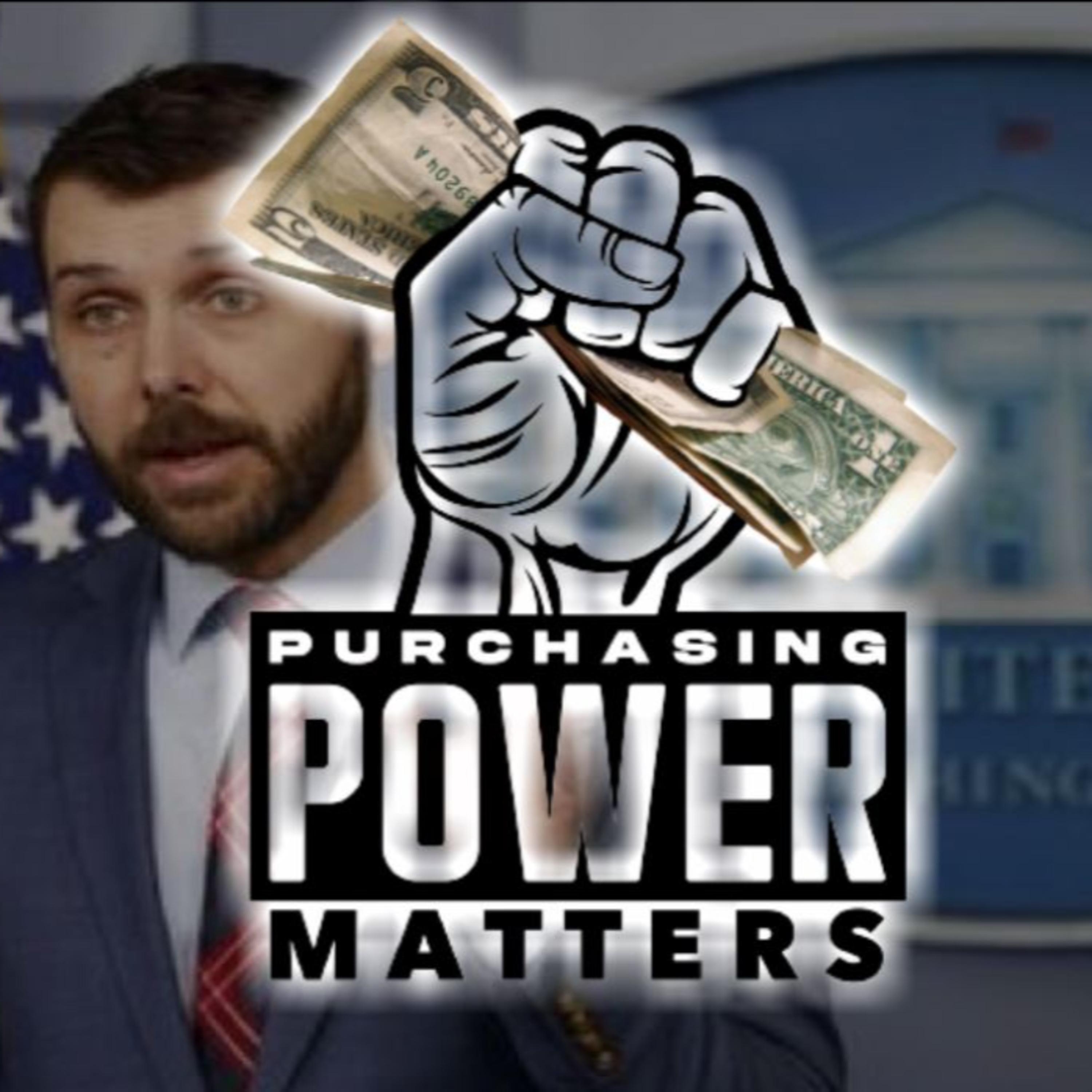 Purchasing Power MattersThere’s No Inflation If You Don’t Count Inflation?Before the coronavirus pandemic, a meme among conservative and libertarian economists when poking fun at Keynesians was: If you don’t live under a roof or eat food, there is no price inflation. 2021-09-2205 min
Purchasing Power MattersThere’s No Inflation If You Don’t Count Inflation?Before the coronavirus pandemic, a meme among conservative and libertarian economists when poking fun at Keynesians was: If you don’t live under a roof or eat food, there is no price inflation. 2021-09-2205 min The Ezra Klein ShowWhat’s Happening to Our Economy Is Like a Natural DisasterThe Biden administration’s first legislative priority is a $1.9 trillion economic rescue package. It’s the kind of mega-package where the individual policies contained inside it — a $15 minimum wage, $1,400 checks, a huge child tax credit expansion, a $50 billion virus testing infrastructure — would be big deals on their own. But together, this would be one of the most consequential packages ever passed.So there’s a lot to talk about here. And who better to talk about it with than my now-colleague Paul Krugman? We dig into the details of the plan and then spiral off into some other topi...2021-01-291h 08
The Ezra Klein ShowWhat’s Happening to Our Economy Is Like a Natural DisasterThe Biden administration’s first legislative priority is a $1.9 trillion economic rescue package. It’s the kind of mega-package where the individual policies contained inside it — a $15 minimum wage, $1,400 checks, a huge child tax credit expansion, a $50 billion virus testing infrastructure — would be big deals on their own. But together, this would be one of the most consequential packages ever passed.So there’s a lot to talk about here. And who better to talk about it with than my now-colleague Paul Krugman? We dig into the details of the plan and then spiral off into some other topi...2021-01-291h 08 Vacuous VocationImperfections of Economic ReliefThe policy of Inflation and Monetary Theory have become very popular over the past century. It is acceptable among some politicians, philosophers, and even economists to abandon the notion of hard currency in pursuit of credit expansion and additional spending. What these people do not understand is the quantity theory of money that states that for every increase in the quantity of money, the value of the monetary unit decreases. MV=PQ. Furthermore, the policy of inflation, which is the increase in the money supply, is the most radical institution in society because it affects peoples' spendings, earnings, and...2020-12-2815 min
Vacuous VocationImperfections of Economic ReliefThe policy of Inflation and Monetary Theory have become very popular over the past century. It is acceptable among some politicians, philosophers, and even economists to abandon the notion of hard currency in pursuit of credit expansion and additional spending. What these people do not understand is the quantity theory of money that states that for every increase in the quantity of money, the value of the monetary unit decreases. MV=PQ. Furthermore, the policy of inflation, which is the increase in the money supply, is the most radical institution in society because it affects peoples' spendings, earnings, and...2020-12-2815 min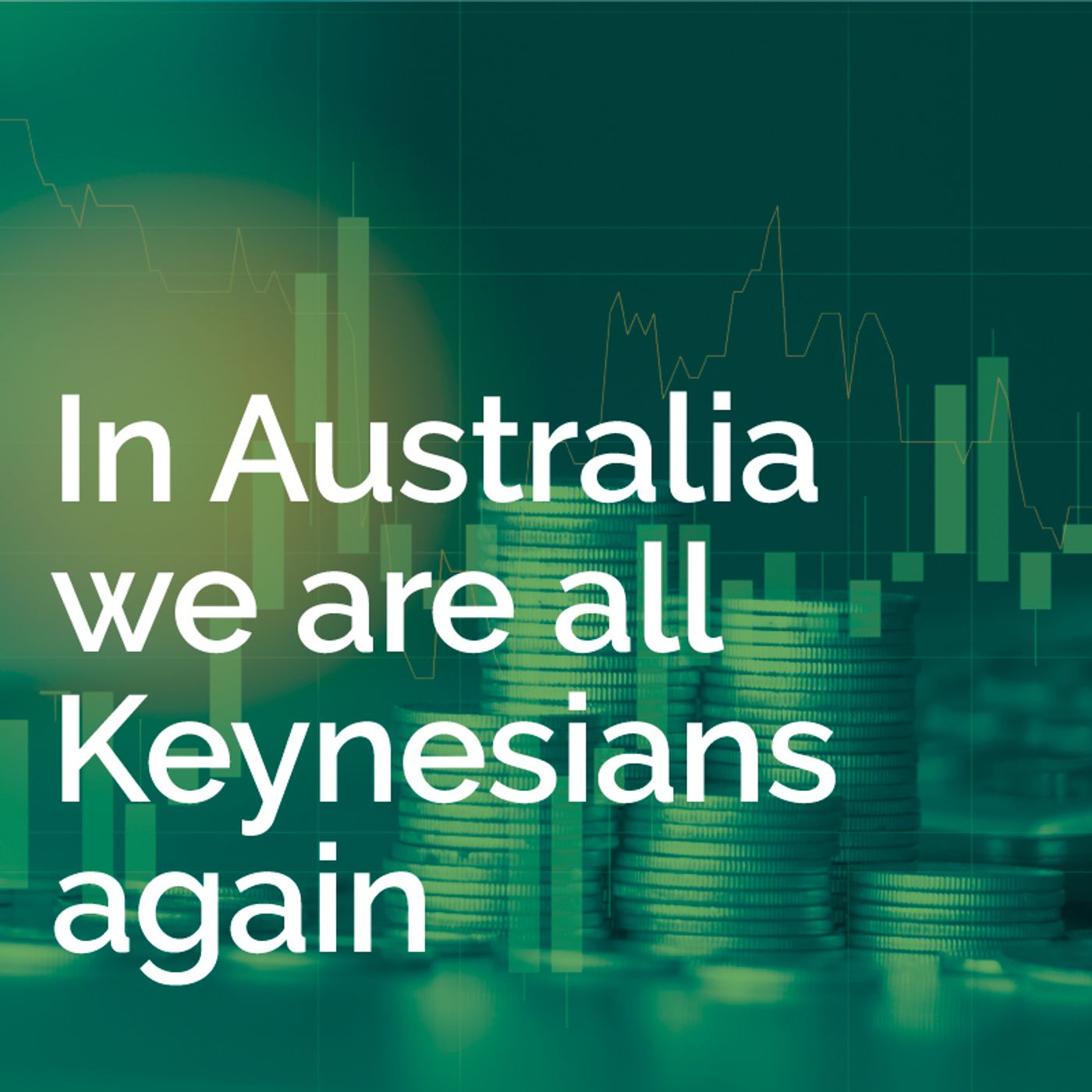 Connect To GrowIn Australia we are all Keynesians againWhen the government announced its massive in investment in the nation it was done knowing that the money could be borrowed at less than 1% per annum and it has more than a decade to work out his refinancing strategy, so there is never been a better time to invest in the lucky country.It will be a great time to be part of a new growth story and shared prosperity. Australia is protected by the natural isolation of being an island-continent which is blessed with resources and exports enough food to feed another 50 million people. Australia is located...2020-10-0811 min
Connect To GrowIn Australia we are all Keynesians againWhen the government announced its massive in investment in the nation it was done knowing that the money could be borrowed at less than 1% per annum and it has more than a decade to work out his refinancing strategy, so there is never been a better time to invest in the lucky country.It will be a great time to be part of a new growth story and shared prosperity. Australia is protected by the natural isolation of being an island-continent which is blessed with resources and exports enough food to feed another 50 million people. Australia is located...2020-10-0811 min Tom Woods Show, Archive 5Ep. 1449 The Boatload of Real-Life Examples Keynesians Have to Ignore Keynesians like to pretend that they're impartial scientists, following the evidence wherever it leads. We, meanwhile, are portrayed as too blinded by ideology to be worth listening to. So today I run through some very challenging episodes for Keynesians to explain, and we see who the real scientists are.2020-09-2133 min
Tom Woods Show, Archive 5Ep. 1449 The Boatload of Real-Life Examples Keynesians Have to Ignore Keynesians like to pretend that they're impartial scientists, following the evidence wherever it leads. We, meanwhile, are portrayed as too blinded by ideology to be worth listening to. So today I run through some very challenging episodes for Keynesians to explain, and we see who the real scientists are.2020-09-2133 min The Resistance Library from Ammo.comMilton Friedman: The Forgotten History of the Godfather of Conservative Libertarianism On today’s episode Dan and Sam discuss Milton Friedman, the Godfather of American conservative libertarianism. Friedman was, at a time when it was deeply unfashionable in official circles, a fierce critic of Keynesian economics. He was a leader of the second generation of libertarian economists to come out of the University of Chicago. Among the people recruited or mentored by him at the university include Thomas Sowell, Gary Becker, Robert Fogel and Robert Lucas, Jr. Friedman often used the jargon and methodology of Keynesians while rejecting their basic premises, coming to very different conclusions than his Keynesian counterparts. One of hi...2020-07-2849 min
The Resistance Library from Ammo.comMilton Friedman: The Forgotten History of the Godfather of Conservative Libertarianism On today’s episode Dan and Sam discuss Milton Friedman, the Godfather of American conservative libertarianism. Friedman was, at a time when it was deeply unfashionable in official circles, a fierce critic of Keynesian economics. He was a leader of the second generation of libertarian economists to come out of the University of Chicago. Among the people recruited or mentored by him at the university include Thomas Sowell, Gary Becker, Robert Fogel and Robert Lucas, Jr. Friedman often used the jargon and methodology of Keynesians while rejecting their basic premises, coming to very different conclusions than his Keynesian counterparts. One of hi...2020-07-2849 min Follow The MoneyRenewing Australia with a Green New Deal with Adam BandtFeaturing Greens Leader Adam Bandt in conversation with chief economist Richard Denniss about what a Green New Deal means and how it would work. The audio was recorded live on May 27 2020 as part of the Australia Institute's 'Economics of a Pandemic' webinar series. The government has been talking as if it understood Keynesian economics, but its reaction to the $60 billion JobKeeper black hole shows they clearly do not think or act like Keynesians. Richard Denniss unpacks the spectacular failure of policy and accountability, as well as explaining what Keynesians economics actually means.Visit tai.org.au for our latest pandemic...2020-05-2759 min
Follow The MoneyRenewing Australia with a Green New Deal with Adam BandtFeaturing Greens Leader Adam Bandt in conversation with chief economist Richard Denniss about what a Green New Deal means and how it would work. The audio was recorded live on May 27 2020 as part of the Australia Institute's 'Economics of a Pandemic' webinar series. The government has been talking as if it understood Keynesian economics, but its reaction to the $60 billion JobKeeper black hole shows they clearly do not think or act like Keynesians. Richard Denniss unpacks the spectacular failure of policy and accountability, as well as explaining what Keynesians economics actually means.Visit tai.org.au for our latest pandemic...2020-05-2759 min Follow The MoneyBlack holes and KeynesiansThe government has been talking as if it understood Keynesian economics, but its reaction to the $60 billion JobKeeper black hole shows they clearly do not think or act like Keynesians. Richard Denniss unpacks the spectacular failure of policy and accountability, as well as explaining what Keynesians economics actually means.Visit tai.org.au for our latest pandemic economic research and analysis // @theausinstituteHost: Ebony Bennett, deputy director of the Australia Institute // @ebony_bennettGuests: Richard Denniss, chief economist of the Australia Institute // @RDNS_TAIProducer: Jennifer Macey. Montage by Lucy LuoTheme music is by...2020-05-2632 min
Follow The MoneyBlack holes and KeynesiansThe government has been talking as if it understood Keynesian economics, but its reaction to the $60 billion JobKeeper black hole shows they clearly do not think or act like Keynesians. Richard Denniss unpacks the spectacular failure of policy and accountability, as well as explaining what Keynesians economics actually means.Visit tai.org.au for our latest pandemic economic research and analysis // @theausinstituteHost: Ebony Bennett, deputy director of the Australia Institute // @ebony_bennettGuests: Richard Denniss, chief economist of the Australia Institute // @RDNS_TAIProducer: Jennifer Macey. Montage by Lucy LuoTheme music is by...2020-05-2632 min The Prospect PodcastPaul Krugman on zombie economicsNobel prize-winning economist and New York Times columnist Paul Krugman joins the Prospect podcast to talk about what he calls “zombie economics”: the right-wing free market economic orthodoxy that he believes persists past its sell-by date. He also reflects on America’s 2020 election, whether he misjudged Obama, and if he has faith in the future of economics.Paul Krugman’s Arguing with Zombies: Economics, Politics, and the Fight for a Better Future, is published by W. W. Norton: https://www.wwnorton.co.uk/books/9781324005018-arguing-with-zombiesArticles discussed in the introduction:Paul Krugman...2020-03-3135 min
The Prospect PodcastPaul Krugman on zombie economicsNobel prize-winning economist and New York Times columnist Paul Krugman joins the Prospect podcast to talk about what he calls “zombie economics”: the right-wing free market economic orthodoxy that he believes persists past its sell-by date. He also reflects on America’s 2020 election, whether he misjudged Obama, and if he has faith in the future of economics.Paul Krugman’s Arguing with Zombies: Economics, Politics, and the Fight for a Better Future, is published by W. W. Norton: https://www.wwnorton.co.uk/books/9781324005018-arguing-with-zombiesArticles discussed in the introduction:Paul Krugman...2020-03-3135 min American Conservative UniversityRepudiating the National Debt, Drag Queen Burlesque for Kids, Lesbian YouTuber Leaves the Left, The Student Debt Crisis.Repudiating the National Debt, Drag Queen Burlesque for Kids, Lesbian YouTuber Leaves the Left, The Student Debt Crisis. Repudiating the National Debt Andrew Klavan - Lesbian YouTuber Walks Away From the Left!Matt Walsh -The Student Debt Crisis is out of ControlDrag Queen Dances Suggestively Around a Young Girl. Repudiating the National Debt | by Murray N. Rothbard.https://youtu.be/pDRMQoTQaME LibertyInOurTimeBefore the Reagan era, conservatives were clear about how they felt about deficits and the public debt: a balanced budget was good, and deficits and the public debt were bad, piled up by free-spending Keynesians and socialists, who absurdly p...2020-03-0539 min
American Conservative UniversityRepudiating the National Debt, Drag Queen Burlesque for Kids, Lesbian YouTuber Leaves the Left, The Student Debt Crisis.Repudiating the National Debt, Drag Queen Burlesque for Kids, Lesbian YouTuber Leaves the Left, The Student Debt Crisis. Repudiating the National Debt Andrew Klavan - Lesbian YouTuber Walks Away From the Left!Matt Walsh -The Student Debt Crisis is out of ControlDrag Queen Dances Suggestively Around a Young Girl. Repudiating the National Debt | by Murray N. Rothbard.https://youtu.be/pDRMQoTQaME LibertyInOurTimeBefore the Reagan era, conservatives were clear about how they felt about deficits and the public debt: a balanced budget was good, and deficits and the public debt were bad, piled up by free-spending Keynesians and socialists, who absurdly p...2020-03-0539 min Bitcoin AudibleCryptoQuikRead_353 - We're All Default Keynesians Now [Brady Swenson]"Unless you began your Austrian economic education at birth in some unknown Austrian paradise, on this planet at this particular time in human history, I think we can safely say we’re all Keynesians by default." - Brady Swenson @citizenbitcoin
Today we read a great little piece on how our economic understandings have become so skewed, why the default has become one of centralized, top down control over money, and how Bitcoin is set to right the world of our economic foundations. We've got a fun rant after this one too, so don't miss it!
Ch...2020-02-1343 min
Bitcoin AudibleCryptoQuikRead_353 - We're All Default Keynesians Now [Brady Swenson]"Unless you began your Austrian economic education at birth in some unknown Austrian paradise, on this planet at this particular time in human history, I think we can safely say we’re all Keynesians by default." - Brady Swenson @citizenbitcoin
Today we read a great little piece on how our economic understandings have become so skewed, why the default has become one of centralized, top down control over money, and how Bitcoin is set to right the world of our economic foundations. We've got a fun rant after this one too, so don't miss it!
Ch...2020-02-1343 min The Governance PodcastSocialism and the Future of Heterodox Economics: In Conversation with Geoffrey HodgsonIs socialism feasible? What is the future of heterodox economics after the financial crisis? In this episode of the Governance Podcast, Mark Pennington (King's College London) sits down with Geoffrey Hodgson (Loughborough University London) for a wide-ranging conversation on the nature of social democracy, neoliberalism, and new paradigms in economics.
Subscribe on iTunes and Spotify
Subscribe to the Governance Podcast on iTunes and Spotify today and get all our latest episodes directly in your pocket.
Follow Us
For more information about our upcoming podcasts and events, follow us on facebook, twitter or instagram (@csgskcl).
The Guest
Geoffr...2020-02-0658 min
The Governance PodcastSocialism and the Future of Heterodox Economics: In Conversation with Geoffrey HodgsonIs socialism feasible? What is the future of heterodox economics after the financial crisis? In this episode of the Governance Podcast, Mark Pennington (King's College London) sits down with Geoffrey Hodgson (Loughborough University London) for a wide-ranging conversation on the nature of social democracy, neoliberalism, and new paradigms in economics.
Subscribe on iTunes and Spotify
Subscribe to the Governance Podcast on iTunes and Spotify today and get all our latest episodes directly in your pocket.
Follow Us
For more information about our upcoming podcasts and events, follow us on facebook, twitter or instagram (@csgskcl).
The Guest
Geoffr...2020-02-0658 min Acton LineAre we all Keynesians now? Why Lord Acton matters todayIn 1965, Milton Friedman was quoted by Time magazine for saying "We are all Keynesians now," referring to how pervasive the thoughts of economist John Maynard Keynes had become in society and economics. Known as the founding father of macroeconomics, Keynes's economic thought changed the way economics is approached, for better or for worse. How did his economic thought become so dominant and where has it left us? Victor Claar, professor of economics at Florida Gulf Coast University, explains. Afterwards, Acton's Dan Hugger joins the podcast to break down the life and thought of Lord Acton. John Emerich Edward Dalberg-Acton, the...2019-11-1336 min
Acton LineAre we all Keynesians now? Why Lord Acton matters todayIn 1965, Milton Friedman was quoted by Time magazine for saying "We are all Keynesians now," referring to how pervasive the thoughts of economist John Maynard Keynes had become in society and economics. Known as the founding father of macroeconomics, Keynes's economic thought changed the way economics is approached, for better or for worse. How did his economic thought become so dominant and where has it left us? Victor Claar, professor of economics at Florida Gulf Coast University, explains. Afterwards, Acton's Dan Hugger joins the podcast to break down the life and thought of Lord Acton. John Emerich Edward Dalberg-Acton, the...2019-11-1336 min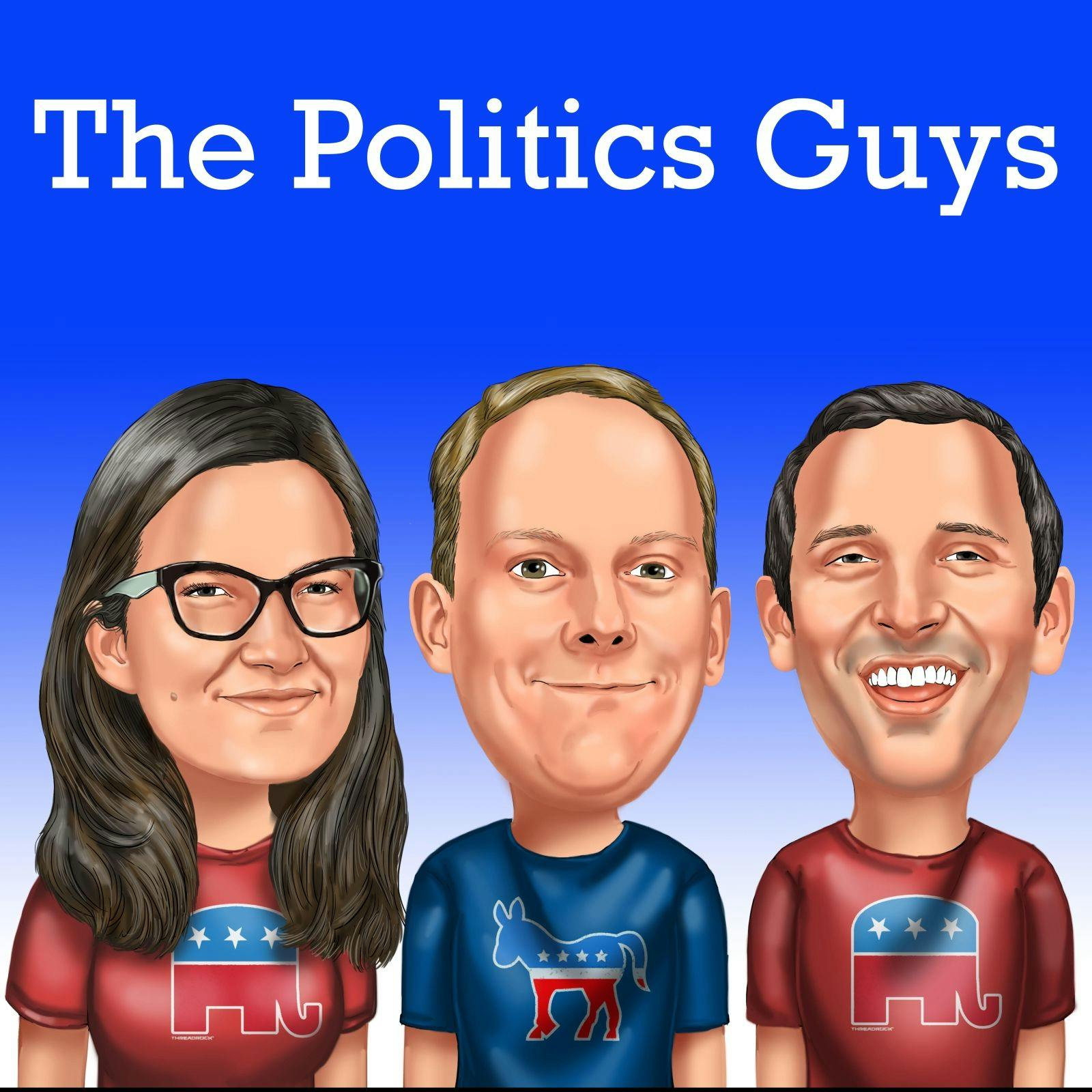 The Politics GuysDeficit, Subpoenas, Trump’s Sixth Veto, Tulsi GabbardTrey and Ken host this episode of the Politics Guys. The duo begins by talking about the increasing U.S. deficit. Trey explains the what the deficit and the national debt are. Then Trey gives some historic context before asking Ken his opinion on the rising deficit under President Trump. Ken argues that Democrats, as Keynesians, would better manage the budget without Republicans. His basic argument is that Republicans never pay for needed spending. Trey pushes back and asks, if that is the case, why Democrats have never stopped deficit spending when they held office. Trey suggests that the...2019-10-2652 min
The Politics GuysDeficit, Subpoenas, Trump’s Sixth Veto, Tulsi GabbardTrey and Ken host this episode of the Politics Guys. The duo begins by talking about the increasing U.S. deficit. Trey explains the what the deficit and the national debt are. Then Trey gives some historic context before asking Ken his opinion on the rising deficit under President Trump. Ken argues that Democrats, as Keynesians, would better manage the budget without Republicans. His basic argument is that Republicans never pay for needed spending. Trey pushes back and asks, if that is the case, why Democrats have never stopped deficit spending when they held office. Trey suggests that the...2019-10-2652 min SA For FAsThe Asset Allocator: We Are All Keynesians Now (Podcast)Germany’s finance minister has announced that Berlin could make 50 billion euros available for stimulus spending, following an announcement by the Bundesbank concerning recession risks. This podcast (6:06) argues that such an un-German move speaks profoundly to the near universal inhalation of the debt narcotic. When the next crisis occurs, debt will likely be deeply implicated. Advisors should therefore consider an allocation to gold, which is apt to strengthen in a financial crisis, as the only time-tested safeguard against high and rising inflation.2019-08-2105 min
SA For FAsThe Asset Allocator: We Are All Keynesians Now (Podcast)Germany’s finance minister has announced that Berlin could make 50 billion euros available for stimulus spending, following an announcement by the Bundesbank concerning recession risks. This podcast (6:06) argues that such an un-German move speaks profoundly to the near universal inhalation of the debt narcotic. When the next crisis occurs, debt will likely be deeply implicated. Advisors should therefore consider an allocation to gold, which is apt to strengthen in a financial crisis, as the only time-tested safeguard against high and rising inflation.2019-08-2105 min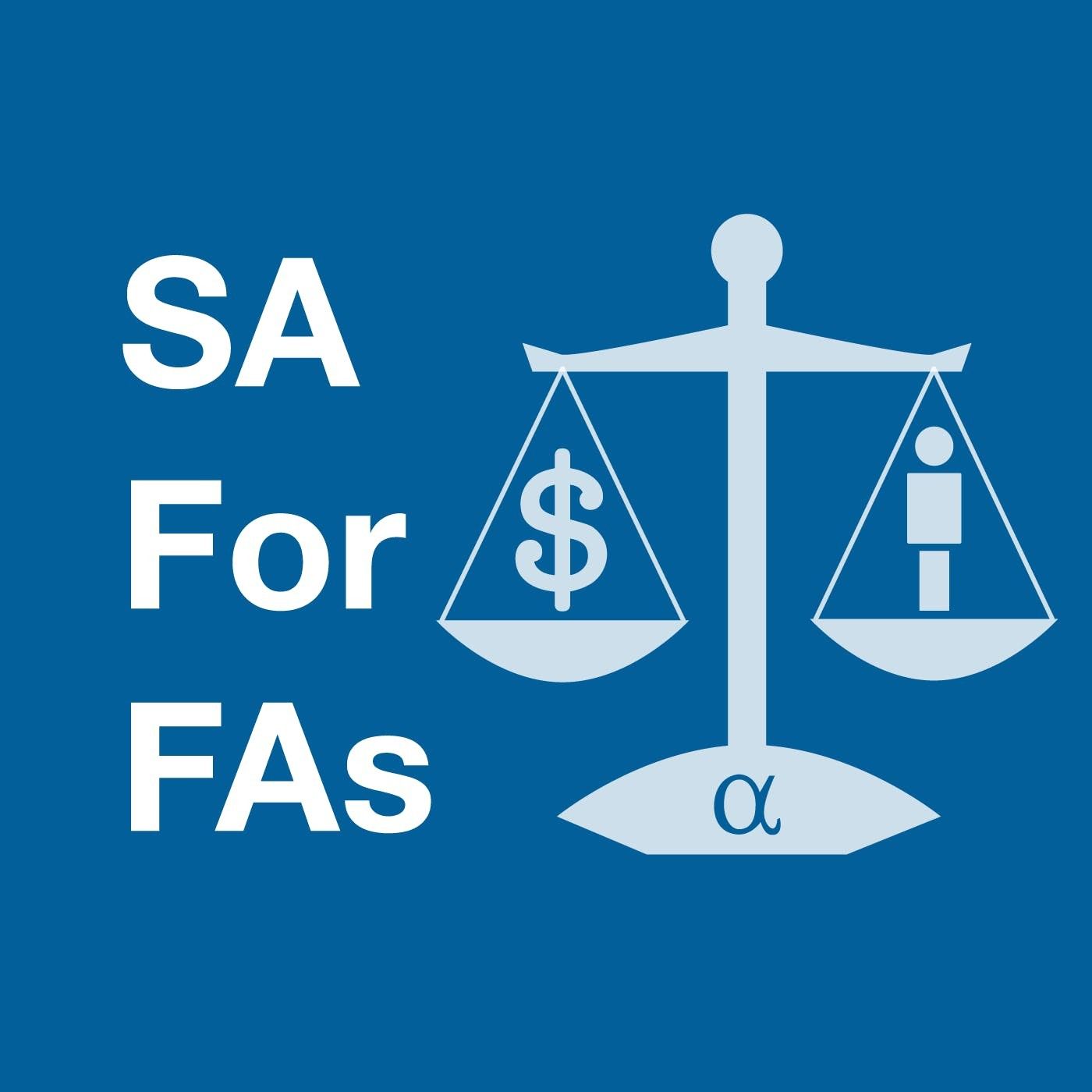 SA For FAsThe Asset Allocator: We Are All Keynesians Now (Podcast)Germany’s finance minister has announced that Berlin could make 50 billion euros available for stimulus spending, following an announcement by the Bundesbank concerning recession risks. This podcast (6:06) argues that such an un-German move speaks profoundly to the near universal inhalation of the debt narcotic. When the next crisis occurs, debt will likely be deeply implicated. Advisors should therefore consider an allocation to gold, which is apt to strengthen in a financial crisis, as the only time-tested safeguard against high and rising inflation.Learn more about your ad choices. Visit megaphone.fm/adchoices2019-08-2105 min
SA For FAsThe Asset Allocator: We Are All Keynesians Now (Podcast)Germany’s finance minister has announced that Berlin could make 50 billion euros available for stimulus spending, following an announcement by the Bundesbank concerning recession risks. This podcast (6:06) argues that such an un-German move speaks profoundly to the near universal inhalation of the debt narcotic. When the next crisis occurs, debt will likely be deeply implicated. Advisors should therefore consider an allocation to gold, which is apt to strengthen in a financial crisis, as the only time-tested safeguard against high and rising inflation.Learn more about your ad choices. Visit megaphone.fm/adchoices2019-08-2105 min SA For FAsThe Asset Allocator: We Are All Keynesians Now (Podcast)Germany’s finance minister has announced that Berlin could make 50 billion euros available for stimulus spending, following an announcement by the Bundesbank concerning recession risks. This podcast (6:06) argues that such an un-German move speaks profoundly to the near universal inhalation of the debt narcotic. When the next crisis occurs, debt will likely be deeply implicated. Advisors should therefore consider an allocation to gold, which is apt to strengthen in a financial crisis, as the only time-tested safeguard against high and rising inflation.2019-08-2105 min
SA For FAsThe Asset Allocator: We Are All Keynesians Now (Podcast)Germany’s finance minister has announced that Berlin could make 50 billion euros available for stimulus spending, following an announcement by the Bundesbank concerning recession risks. This podcast (6:06) argues that such an un-German move speaks profoundly to the near universal inhalation of the debt narcotic. When the next crisis occurs, debt will likely be deeply implicated. Advisors should therefore consider an allocation to gold, which is apt to strengthen in a financial crisis, as the only time-tested safeguard against high and rising inflation.2019-08-2105 min SA For FAsThe Asset Allocator: We Are All Keynesians Now (Podcast)Germany’s finance minister has announced that Berlin could make 50 billion euros available for stimulus spending, following an announcement by the Bundesbank concerning recession risks. This podcast (6:06) argues that such an un-German move speaks profoundly to the near universal inhalation of the debt narcotic. When the next crisis occurs, debt will likely be deeply implicated. Advisors should therefore consider an allocation to gold, which is apt to strengthen in a financial crisis, as the only time-tested safeguard against high and rising inflation.2019-08-2105 min
SA For FAsThe Asset Allocator: We Are All Keynesians Now (Podcast)Germany’s finance minister has announced that Berlin could make 50 billion euros available for stimulus spending, following an announcement by the Bundesbank concerning recession risks. This podcast (6:06) argues that such an un-German move speaks profoundly to the near universal inhalation of the debt narcotic. When the next crisis occurs, debt will likely be deeply implicated. Advisors should therefore consider an allocation to gold, which is apt to strengthen in a financial crisis, as the only time-tested safeguard against high and rising inflation.2019-08-2105 min SA For FAsThe Asset Allocator: We Are All Keynesians Now (Podcast)Germany’s finance minister has announced that Berlin could make 50 billion euros available for stimulus spending, following an announcement by the Bundesbank concerning recession risks. This podcast (6:06) argues that such an un-German move speaks profoundly to the near universal inhalation of the debt narcotic. When the next crisis occurs, debt will likely be deeply implicated. Advisors should therefore consider an allocation to gold, which is apt to strengthen in a financial crisis, as the only time-tested safeguard against high and rising inflation.2019-08-2105 min
SA For FAsThe Asset Allocator: We Are All Keynesians Now (Podcast)Germany’s finance minister has announced that Berlin could make 50 billion euros available for stimulus spending, following an announcement by the Bundesbank concerning recession risks. This podcast (6:06) argues that such an un-German move speaks profoundly to the near universal inhalation of the debt narcotic. When the next crisis occurs, debt will likely be deeply implicated. Advisors should therefore consider an allocation to gold, which is apt to strengthen in a financial crisis, as the only time-tested safeguard against high and rising inflation.2019-08-2105 min SA For FAsThe Asset Allocator: We Are All Keynesians Now (Podcast)Germany’s finance minister has announced that Berlin could make 50 billion euros available for stimulus spending, following an announcement by the Bundesbank concerning recession risks. This podcast (6:06) argues that such an un-German move speaks profoundly to the near universal inhalation of the debt narcotic. When the next crisis occurs, debt will likely be deeply implicated. Advisors should therefore consider an allocation to gold, which is apt to strengthen in a financial crisis, as the only time-tested safeguard against high and rising inflation.2019-08-2106 min
SA For FAsThe Asset Allocator: We Are All Keynesians Now (Podcast)Germany’s finance minister has announced that Berlin could make 50 billion euros available for stimulus spending, following an announcement by the Bundesbank concerning recession risks. This podcast (6:06) argues that such an un-German move speaks profoundly to the near universal inhalation of the debt narcotic. When the next crisis occurs, debt will likely be deeply implicated. Advisors should therefore consider an allocation to gold, which is apt to strengthen in a financial crisis, as the only time-tested safeguard against high and rising inflation.2019-08-2106 min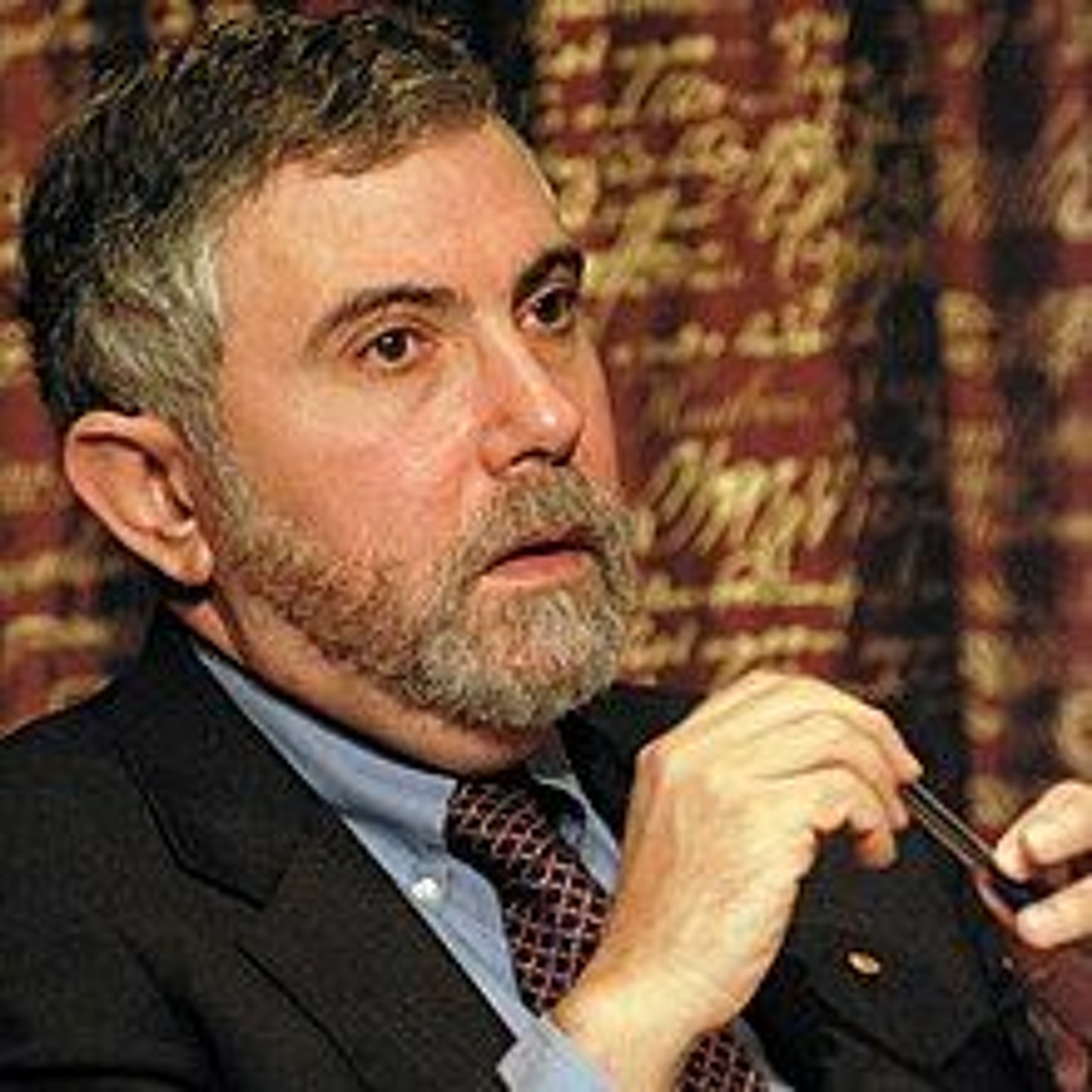 Scottish Liberty PodcastBob Murphy Flays Economic Fallacies Of Paul Krugman To Death! In Contra KrugmanScottish Liberty Podcast episode 104 brought to you by Antony Sammeroff and Tom Laird. Special guest economist Robert P. Murphy PhD., tackles the economic myths of the John Maynard Keynes Keynesians, including the notorious Paul Krugman, economics Op-Ed columnist of the New York Times.Get Bob Murphy's new book Contra Krugman from Amazon, Contra Krugman: Smashing the Errors of America's Most Famous Keynesian.2018-09-271h 17
Scottish Liberty PodcastBob Murphy Flays Economic Fallacies Of Paul Krugman To Death! In Contra KrugmanScottish Liberty Podcast episode 104 brought to you by Antony Sammeroff and Tom Laird. Special guest economist Robert P. Murphy PhD., tackles the economic myths of the John Maynard Keynes Keynesians, including the notorious Paul Krugman, economics Op-Ed columnist of the New York Times.Get Bob Murphy's new book Contra Krugman from Amazon, Contra Krugman: Smashing the Errors of America's Most Famous Keynesian.2018-09-271h 17 The ICO Alert Podcast: Cryptocurrency, blockchain, and ICO interviews.No Bitcoin without Starvation, plus Keynesians, Bailouts, & Tokenizing Robots (Bitgenstein's Table)Bitgenstein’s Table is released every Thursday. (Or Saturdays, when there's a big Toronto blockchain conference all week.) Subscribe on:
- iTunes at itunes.apple.com/us/podcast/id1410515815
- Soundcloud at https://soundcloud.com/bitgenstein
Bitgenstein's Table: the Crypto Philosophy Podcast applies 2500 years of human thought in philosophy, psychology, sociology, history, and economics to the future of blockchain & cryptocurrency & how to make better decisions.
***
As Minister of Finance, he voted against the 2015 bank bailouts in Greece, and resigned when they were passed. He's worked at Valve (makers of Half-Life and Steam) as economist-in-residence. He's taught at Cambridge and written po...2018-08-1825 min
The ICO Alert Podcast: Cryptocurrency, blockchain, and ICO interviews.No Bitcoin without Starvation, plus Keynesians, Bailouts, & Tokenizing Robots (Bitgenstein's Table)Bitgenstein’s Table is released every Thursday. (Or Saturdays, when there's a big Toronto blockchain conference all week.) Subscribe on:
- iTunes at itunes.apple.com/us/podcast/id1410515815
- Soundcloud at https://soundcloud.com/bitgenstein
Bitgenstein's Table: the Crypto Philosophy Podcast applies 2500 years of human thought in philosophy, psychology, sociology, history, and economics to the future of blockchain & cryptocurrency & how to make better decisions.
***
As Minister of Finance, he voted against the 2015 bank bailouts in Greece, and resigned when they were passed. He's worked at Valve (makers of Half-Life and Steam) as economist-in-residence. He's taught at Cambridge and written po...2018-08-1825 min Odd LotsHow A Post-Keynesian Economist Sees The Markets Right NowSrinivas Thiruvadanthai is the Director of Research at the Jerome Levy Forecasting Center, and one of the most interesting commentators on markets and the economy. He's also an economist who fits into the post-Keynesian school of thought. The post-Keynesians -- a group that has a growing following -- argue that the economy is not self-correcting, that central banks have limited influence on the economy or inflation, and that large government debts can be a stabilizing force. In our conversation, he explains his world view and how he uses it to interpret markets right now. See omnystudio.com/l...2018-08-0635 min
Odd LotsHow A Post-Keynesian Economist Sees The Markets Right NowSrinivas Thiruvadanthai is the Director of Research at the Jerome Levy Forecasting Center, and one of the most interesting commentators on markets and the economy. He's also an economist who fits into the post-Keynesian school of thought. The post-Keynesians -- a group that has a growing following -- argue that the economy is not self-correcting, that central banks have limited influence on the economy or inflation, and that large government debts can be a stabilizing force. In our conversation, he explains his world view and how he uses it to interpret markets right now. See omnystudio.com/l...2018-08-0635 min SA For FAsCBO: $1 Trillion DeficitThe non-partisan Congressional Budget Office now projects a U.S. budget deficit of $1 trillion in 2020. Debt scourges do their scourging from the sidelines; in today’s environment, policies are implemented by pseudo-Keynesians (who like spending, but forget Keynes’ call to cut spending, or cut taxes but forget his call to raise them). Ironically, it may take a sharp economic dislocation to make long-term thinking cool again.Learn more about your ad choices. Visit megaphone.fm/adchoices2018-04-1001 min
SA For FAsCBO: $1 Trillion DeficitThe non-partisan Congressional Budget Office now projects a U.S. budget deficit of $1 trillion in 2020. Debt scourges do their scourging from the sidelines; in today’s environment, policies are implemented by pseudo-Keynesians (who like spending, but forget Keynes’ call to cut spending, or cut taxes but forget his call to raise them). Ironically, it may take a sharp economic dislocation to make long-term thinking cool again.Learn more about your ad choices. Visit megaphone.fm/adchoices2018-04-1001 min SA For FAsCBO: $1 Trillion DeficitThe non-partisan Congressional Budget Office now projects a U.S. budget deficit of $1 trillion in 2020. Debt scourges do their scourging from the sidelines; in today’s environment, policies are implemented by pseudo-Keynesians (who like spending, but forget Keynes’ call to cut spending, or cut taxes but forget his call to raise them). Ironically, it may take a sharp economic dislocation to make long-term thinking cool again.2018-04-1001 min
SA For FAsCBO: $1 Trillion DeficitThe non-partisan Congressional Budget Office now projects a U.S. budget deficit of $1 trillion in 2020. Debt scourges do their scourging from the sidelines; in today’s environment, policies are implemented by pseudo-Keynesians (who like spending, but forget Keynes’ call to cut spending, or cut taxes but forget his call to raise them). Ironically, it may take a sharp economic dislocation to make long-term thinking cool again.2018-04-1001 min SA For FAsCBO: $1 Trillion DeficitThe non-partisan Congressional Budget Office now projects a U.S. budget deficit of $1 trillion in 2020. Debt scourges do their scourging from the sidelines; in today’s environment, policies are implemented by pseudo-Keynesians (who like spending, but forget Keynes’ call to cut spending, or cut taxes but forget his call to raise them). Ironically, it may take a sharp economic dislocation to make long-term thinking cool again.2018-04-1001 min
SA For FAsCBO: $1 Trillion DeficitThe non-partisan Congressional Budget Office now projects a U.S. budget deficit of $1 trillion in 2020. Debt scourges do their scourging from the sidelines; in today’s environment, policies are implemented by pseudo-Keynesians (who like spending, but forget Keynes’ call to cut spending, or cut taxes but forget his call to raise them). Ironically, it may take a sharp economic dislocation to make long-term thinking cool again.2018-04-1001 min SA For FAsCBO: $1 Trillion DeficitThe non-partisan Congressional Budget Office now projects a U.S. budget deficit of $1 trillion in 2020. Debt scourges do their scourging from the sidelines; in today’s environment, policies are implemented by pseudo-Keynesians (who like spending, but forget Keynes’ call to cut spending, or cut taxes but forget his call to raise them). Ironically, it may take a sharp economic dislocation to make long-term thinking cool again.2018-04-1001 min
SA For FAsCBO: $1 Trillion DeficitThe non-partisan Congressional Budget Office now projects a U.S. budget deficit of $1 trillion in 2020. Debt scourges do their scourging from the sidelines; in today’s environment, policies are implemented by pseudo-Keynesians (who like spending, but forget Keynes’ call to cut spending, or cut taxes but forget his call to raise them). Ironically, it may take a sharp economic dislocation to make long-term thinking cool again.2018-04-1001 min SA For FAsCBO: $1 Trillion DeficitThe non-partisan Congressional Budget Office now projects a U.S. budget deficit of $1 trillion in 2020. Debt scourges do their scourging from the sidelines; in today’s environment, policies are implemented by pseudo-Keynesians (who like spending, but forget Keynes’ call to cut spending, or cut taxes but forget his call to raise them). Ironically, it may take a sharp economic dislocation to make long-term thinking cool again.2018-04-1001 min
SA For FAsCBO: $1 Trillion DeficitThe non-partisan Congressional Budget Office now projects a U.S. budget deficit of $1 trillion in 2020. Debt scourges do their scourging from the sidelines; in today’s environment, policies are implemented by pseudo-Keynesians (who like spending, but forget Keynes’ call to cut spending, or cut taxes but forget his call to raise them). Ironically, it may take a sharp economic dislocation to make long-term thinking cool again.2018-04-1001 min SA For FAsCBO: $1 Trillion DeficitThe non-partisan Congressional Budget Office now projects a U.S. budget deficit of $1 trillion in 2020. Debt scourges do their scourging from the sidelines; in today’s environment, policies are implemented by pseudo-Keynesians (who like spending, but forget Keynes’ call to cut spending, or cut taxes but forget his call to raise them). Ironically, it may take a sharp economic dislocation to make long-term thinking cool again.2018-04-1001 min
SA For FAsCBO: $1 Trillion DeficitThe non-partisan Congressional Budget Office now projects a U.S. budget deficit of $1 trillion in 2020. Debt scourges do their scourging from the sidelines; in today’s environment, policies are implemented by pseudo-Keynesians (who like spending, but forget Keynes’ call to cut spending, or cut taxes but forget his call to raise them). Ironically, it may take a sharp economic dislocation to make long-term thinking cool again.2018-04-1001 min SA For FAsCBO: $1 Trillion DeficitThe non-partisan Congressional Budget Office now projects a U.S. budget deficit of $1 trillion in 2020. Debt scourges do their scourging from the sidelines; in today’s environment, policies are implemented by pseudo-Keynesians (who like spending, but forget Keynes’ call to cut spending, or cut taxes but forget his call to raise them). Ironically, it may take a sharp economic dislocation to make long-term thinking cool again.2018-04-1001 min
SA For FAsCBO: $1 Trillion DeficitThe non-partisan Congressional Budget Office now projects a U.S. budget deficit of $1 trillion in 2020. Debt scourges do their scourging from the sidelines; in today’s environment, policies are implemented by pseudo-Keynesians (who like spending, but forget Keynes’ call to cut spending, or cut taxes but forget his call to raise them). Ironically, it may take a sharp economic dislocation to make long-term thinking cool again.2018-04-1001 min Dollars and NonsenseHow to Break Free From Federal Reserve Money ManipulationIn this episode, we discuss the differences between Austrian economics and Keynesian economics. And will explain how you can use infinite banking to break free from the money manipulation of the Federal Reserve. ~ Get a Free Copy of The Tree of Wealth by reviewing this podcast here: https://livingwealth.com/review/ ~ Get resources and transcripts from this episode by visiting: https://livingwealth.com/e38/ In episode 36, we covered hyperinflation, cryptocurrencies, infinite banking, and how all of them go hand in hand. And we talked a little bit about economics.2018-03-1927 min
Dollars and NonsenseHow to Break Free From Federal Reserve Money ManipulationIn this episode, we discuss the differences between Austrian economics and Keynesian economics. And will explain how you can use infinite banking to break free from the money manipulation of the Federal Reserve. ~ Get a Free Copy of The Tree of Wealth by reviewing this podcast here: https://livingwealth.com/review/ ~ Get resources and transcripts from this episode by visiting: https://livingwealth.com/e38/ In episode 36, we covered hyperinflation, cryptocurrencies, infinite banking, and how all of them go hand in hand. And we talked a little bit about economics.2018-03-1927 min The Daily 202's Big IdeaRepublicans are all Keynesians now, but not Rand PaulRand Paul’s short-lived shutdown is ending, but his warning about GOP deficit hypocrisy reverberates2018-02-0908 min
The Daily 202's Big IdeaRepublicans are all Keynesians now, but not Rand PaulRand Paul’s short-lived shutdown is ending, but his warning about GOP deficit hypocrisy reverberates2018-02-0908 min The Peter Schiff Show PodcastObama & Yellen Strand Trump & Powell in Dodge – Ep. 324Janet Yellen Got Out of Dodge
As expected, earlier today, the Federal Reserve decided not to raise interest rates; they left them unchanged. The next rate hike is likely to come when Powell takes the reins at the Fed. Janet Yellen got out of Dodge! This is the second Fed chairman to be able to pull this off. Bernanke inherited a disaster, and he got out of Dodge, and so did Janet Yellen.
Greenspan as Dr. Frankenstein, Fed Policy as Monster
I don't think Powell is going to be as fortunate as his two predecessors. In fact Ala...2018-02-0135 min
The Peter Schiff Show PodcastObama & Yellen Strand Trump & Powell in Dodge – Ep. 324Janet Yellen Got Out of Dodge
As expected, earlier today, the Federal Reserve decided not to raise interest rates; they left them unchanged. The next rate hike is likely to come when Powell takes the reins at the Fed. Janet Yellen got out of Dodge! This is the second Fed chairman to be able to pull this off. Bernanke inherited a disaster, and he got out of Dodge, and so did Janet Yellen.
Greenspan as Dr. Frankenstein, Fed Policy as Monster
I don't think Powell is going to be as fortunate as his two predecessors. In fact Ala...2018-02-0135 min Crypto VoicesJimmy Song: Bitcoin Developer & DecoderCrypto Voices: Episode 29
Show support appreciated: 35iDYDYqRdN2x6KGcpdV2W1Hy3AjGje9oL
Matthew & Fernando interview Bitcoin developer Jimmy Song.
We discuss Jimmy's thoughts on 2017 in crypto (what he's learned and what he's written about), the risk of hard forks, what will scare you to sell(?), his post on Crypto Keynesians vs. Crypto Austrians, Bitcoin's role as a medium of exchange vs. store of value, Bitcoin's position as a base-level protocol, the value overflow incident of 2010, effects of altcoins, and the difficulty of predictions.
Links for more info:
https://medium.com/@jimmysong
https://www.youtube.com/channel/UCEFJVYNiPp8xeIUyfaPCPQw
https...2018-01-1656 min
Crypto VoicesJimmy Song: Bitcoin Developer & DecoderCrypto Voices: Episode 29
Show support appreciated: 35iDYDYqRdN2x6KGcpdV2W1Hy3AjGje9oL
Matthew & Fernando interview Bitcoin developer Jimmy Song.
We discuss Jimmy's thoughts on 2017 in crypto (what he's learned and what he's written about), the risk of hard forks, what will scare you to sell(?), his post on Crypto Keynesians vs. Crypto Austrians, Bitcoin's role as a medium of exchange vs. store of value, Bitcoin's position as a base-level protocol, the value overflow incident of 2010, effects of altcoins, and the difficulty of predictions.
Links for more info:
https://medium.com/@jimmysong
https://www.youtube.com/channel/UCEFJVYNiPp8xeIUyfaPCPQw
https...2018-01-1656 min Contra KrugmanEp. 114 What's Wrong With Keynes, in a NutshellNo Krugman column this week for us; instead we step back and look at the big picture: what exactly do Keynesians get wrong in their understanding of the economy? Show notes for Ep. 1142017-11-2529 min
Contra KrugmanEp. 114 What's Wrong With Keynes, in a NutshellNo Krugman column this week for us; instead we step back and look at the big picture: what exactly do Keynesians get wrong in their understanding of the economy? Show notes for Ep. 1142017-11-2529 min The Peter Schiff Show PodcastThe Swamp Wins on Taxes and the Fed – Ep. 297No Change in the Fed Swamp
The announcement of the new Fed Chair, Jerome Powell, represents a commitment to the status quo at the Fed. President Trump has nominated the person most likely to do exactly what Janet Yellen did for President Obama. Powell has voted in lock step with Janet Yellen for the entire time she has chaired the Fed. The only real difference between the two is that Yellen is a Democrat and Powell is a Republican, even though he was nominated to be on the Fed by President Obama.
Politics as Usual, Rather than Change2017-11-0345 min
The Peter Schiff Show PodcastThe Swamp Wins on Taxes and the Fed – Ep. 297No Change in the Fed Swamp
The announcement of the new Fed Chair, Jerome Powell, represents a commitment to the status quo at the Fed. President Trump has nominated the person most likely to do exactly what Janet Yellen did for President Obama. Powell has voted in lock step with Janet Yellen for the entire time she has chaired the Fed. The only real difference between the two is that Yellen is a Democrat and Powell is a Republican, even though he was nominated to be on the Fed by President Obama.
Politics as Usual, Rather than Change2017-11-0345 min The Peter Schiff Show PodcastMiddle Class Tax Hikes Put Trump Tax Cuts in Jeopardy – Ep. 291Congress May Not Deliver Promised Economic Growth
I think part of the renewed weakness in the dollar may be due to the feeling that all the tax cuts are not going to pass. The Trump/Republican plan outlined some days ago will be difficult to to get through Congress. Even if it does get through Congress it is not going to deliver the economic growth that is being advertised.
Tax Cuts Masquerading as Reform
Go back to the origins to the Republican dialogue about tax reform. They actually wanted to do reform. All the reform is out th...2017-10-1132 min
The Peter Schiff Show PodcastMiddle Class Tax Hikes Put Trump Tax Cuts in Jeopardy – Ep. 291Congress May Not Deliver Promised Economic Growth
I think part of the renewed weakness in the dollar may be due to the feeling that all the tax cuts are not going to pass. The Trump/Republican plan outlined some days ago will be difficult to to get through Congress. Even if it does get through Congress it is not going to deliver the economic growth that is being advertised.
Tax Cuts Masquerading as Reform
Go back to the origins to the Republican dialogue about tax reform. They actually wanted to do reform. All the reform is out th...2017-10-1132 min Justin Mohr ShowThe economics of Hurricane Harvey and why “price gouging” isn’t the problem the media says it is!Hurricane Harvey is looking like it will be the costliest natural disaster to ever occur in the United States. This devastation has destroyed the lives of millions of people. The Keynesians view disasters as a good jobs program that can boost the economy and keep spending going. How ridiculous is this!? But this is really how these “economists” think and it’s crazy that people can believe this garbage. Price gouging is seen as a negative but allowing prices to rise during disasters allows goods to flow to their most efficient uses. It’s basic economics and the government shouldn’t...2017-09-0725 min
Justin Mohr ShowThe economics of Hurricane Harvey and why “price gouging” isn’t the problem the media says it is!Hurricane Harvey is looking like it will be the costliest natural disaster to ever occur in the United States. This devastation has destroyed the lives of millions of people. The Keynesians view disasters as a good jobs program that can boost the economy and keep spending going. How ridiculous is this!? But this is really how these “economists” think and it’s crazy that people can believe this garbage. Price gouging is seen as a negative but allowing prices to rise during disasters allows goods to flow to their most efficient uses. It’s basic economics and the government shouldn’t...2017-09-0725 min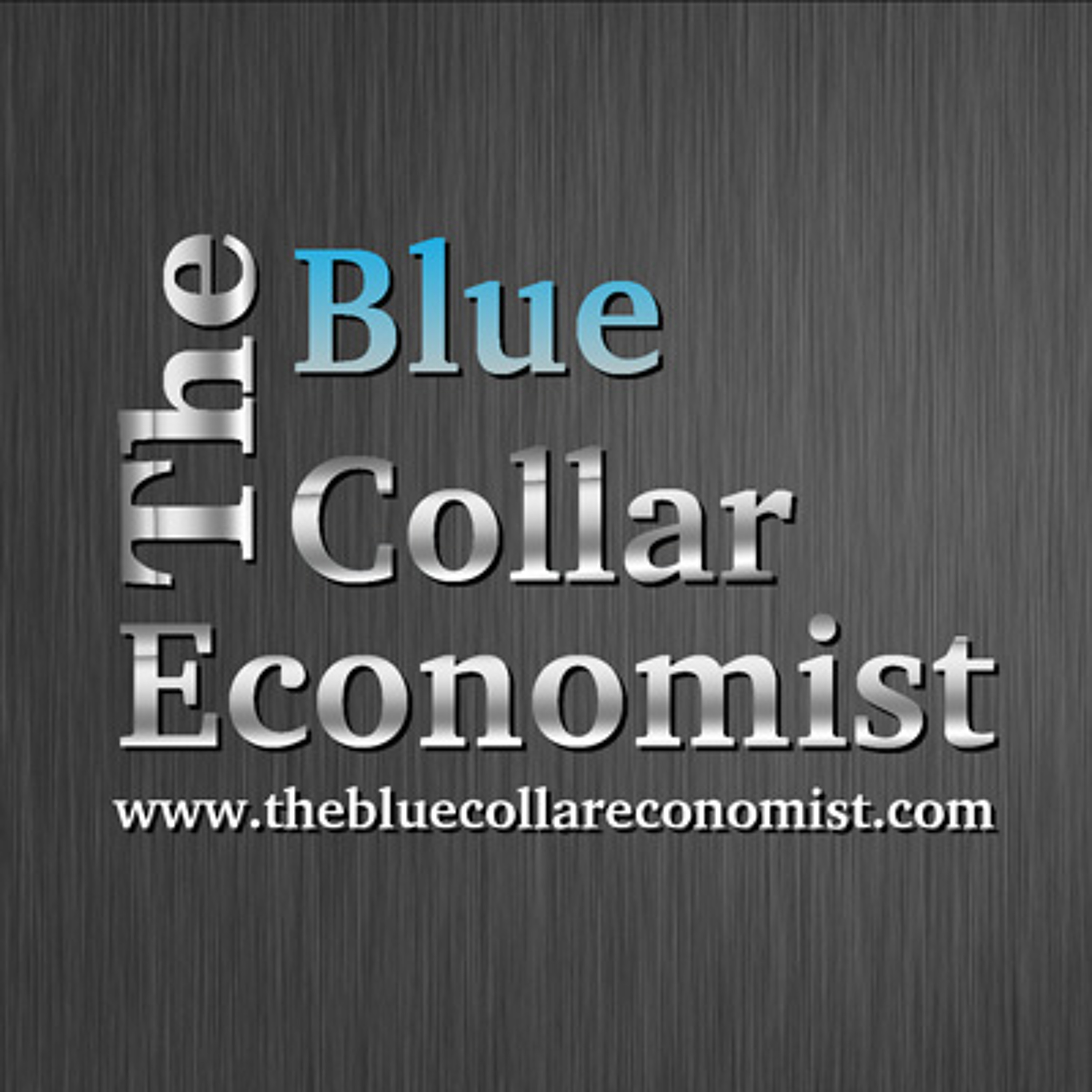 The Blue Collar Economist PodcastMore Broken WindowsAgain and again, we hear pundits and talking heads explain how disasters can be good for the economy. If that were true, then Bierut would be the wealthiest place on Earth. We'll learn how destroying capital is never a good thing, no matter how often the Keynesians repeat the mantra.
The Blue Collar Economist(www.thebluecollareconomist.com.2017-09-0200 min
The Blue Collar Economist PodcastMore Broken WindowsAgain and again, we hear pundits and talking heads explain how disasters can be good for the economy. If that were true, then Bierut would be the wealthiest place on Earth. We'll learn how destroying capital is never a good thing, no matter how often the Keynesians repeat the mantra.
The Blue Collar Economist(www.thebluecollareconomist.com.2017-09-0200 min Enemy of the State: Murray RothbardEpisode 40 - History of Economic Thought - 6 of 6 - Hayek and His Lamentable Contemporaries - Murray N RothbardMurray Rothbard died before he could write the third volume of his famous History of Economic Thought, which would cover the birth and development of the Austrian School, through the Keynesian Revolution and Chicago School. With this six-lecture course, however, the History of Economic Thought is complete.
6. Hayek and His Lamentable Contemporaries
The Nobel award to F.A. Hayek in 1974 went directly against the tradition of that prize to go only to mathematical forecasters, left-liberals, and government central planners. Not only was Hayek’s work pioneering, but it is also the only correct analysis of business cycles past, present and fu...2017-01-191h 07
Enemy of the State: Murray RothbardEpisode 40 - History of Economic Thought - 6 of 6 - Hayek and His Lamentable Contemporaries - Murray N RothbardMurray Rothbard died before he could write the third volume of his famous History of Economic Thought, which would cover the birth and development of the Austrian School, through the Keynesian Revolution and Chicago School. With this six-lecture course, however, the History of Economic Thought is complete.
6. Hayek and His Lamentable Contemporaries
The Nobel award to F.A. Hayek in 1974 went directly against the tradition of that prize to go only to mathematical forecasters, left-liberals, and government central planners. Not only was Hayek’s work pioneering, but it is also the only correct analysis of business cycles past, present and fu...2017-01-191h 07 The Macro ViewTheMacroView Episode 15: Real Savings & Investment vs Aggregate Demand TheoryMainstream Economic Theory is driven by the old Broken Window Fallacy - Increased Aggregate Demand Despite It's Productivity or Lack Thereof Must by Stimulated.
The keynesians, as a result have made some of the most ridiculous declarations that one could imagine. From Keynes himself advocating the government bury money in bottles deep in coal mines and let people go dig them up - to Krugman advocation deception of the public and a false threat from aliens as a way to justify massive deficit spending to stimulate aggregate demand, despite it's wastefulness.
Tonight we discuss the basic logical fallacies, we discuss...2016-11-2900 min
The Macro ViewTheMacroView Episode 15: Real Savings & Investment vs Aggregate Demand TheoryMainstream Economic Theory is driven by the old Broken Window Fallacy - Increased Aggregate Demand Despite It's Productivity or Lack Thereof Must by Stimulated.
The keynesians, as a result have made some of the most ridiculous declarations that one could imagine. From Keynes himself advocating the government bury money in bottles deep in coal mines and let people go dig them up - to Krugman advocation deception of the public and a false threat from aliens as a way to justify massive deficit spending to stimulate aggregate demand, despite it's wastefulness.
Tonight we discuss the basic logical fallacies, we discuss...2016-11-2900 min Enemy of the State: Murray RothbardEpisode 10 - Introduction to Economics Part 6 of 7 - Murray N RothbardIntroduction to Economics: A Private Seminar with Murray N. Rothbard
What causes business cycles? Keynesians say the cycles happen because the free market economy does not spend enough. Thus, pump spending in. Additionally, Keynesians say that animal spirits cause these cycles. Government must fix things. Nobody could understand Keynes' General Theory. What was simply obscure was wrongly considered deep.
Keynes linked national income with employment, by assuming wage rates are fixed downward. Although Keynes wrote of balanced budgets, there were only deficits.
Part six of seven from Introduction to Economics: A Private Seminar with Murray N. Rothbard.
This lecture on...2016-11-0145 min
Enemy of the State: Murray RothbardEpisode 10 - Introduction to Economics Part 6 of 7 - Murray N RothbardIntroduction to Economics: A Private Seminar with Murray N. Rothbard
What causes business cycles? Keynesians say the cycles happen because the free market economy does not spend enough. Thus, pump spending in. Additionally, Keynesians say that animal spirits cause these cycles. Government must fix things. Nobody could understand Keynes' General Theory. What was simply obscure was wrongly considered deep.
Keynes linked national income with employment, by assuming wage rates are fixed downward. Although Keynes wrote of balanced budgets, there were only deficits.
Part six of seven from Introduction to Economics: A Private Seminar with Murray N. Rothbard.
This lecture on...2016-11-0145 min Mark Geise Show – Mark GeiseEpisode 20 – My Biggest Issues with Keynesian EconomicsI have many issues with Keynesian economics, but in this episode I discuss my biggest contentions: Keynesians don’t explain what …Continue reading →2016-10-2335 min
Mark Geise Show – Mark GeiseEpisode 20 – My Biggest Issues with Keynesian EconomicsI have many issues with Keynesian economics, but in this episode I discuss my biggest contentions: Keynesians don’t explain what …Continue reading →2016-10-2335 min Expand Your Mind on the Go With Free AudiobookJFK and the Reagan Revolution: A Secret History of American Prosperity Audiobook by Brian DomitrovicListen to this audiobook in full for free onhttps://hotaudiobook.com/freeID: 309905
Title: JFK and the Reagan Revolution: A Secret History of American Prosperity
Author: Brian Domitrovic, Lawrence Kudlow
Narrator: Norman Dietz
Format: Unabridged
Length: 09:26:15
Language: English
Release date: 09-06-16
Publisher: Recorded Books
Genres: Business & Economics, History, North America
Summary:
The little-known story of how JFK pioneered supply-side economics Who invented supply-side economics-the idea that cutting tax rates can result in more growth, more prosperity at all income levels, and even more tax revenue flowing into the IRS? Most people would credit the economic team that advised Ronald Reagan...2016-09-069h 26
Expand Your Mind on the Go With Free AudiobookJFK and the Reagan Revolution: A Secret History of American Prosperity Audiobook by Brian DomitrovicListen to this audiobook in full for free onhttps://hotaudiobook.com/freeID: 309905
Title: JFK and the Reagan Revolution: A Secret History of American Prosperity
Author: Brian Domitrovic, Lawrence Kudlow
Narrator: Norman Dietz
Format: Unabridged
Length: 09:26:15
Language: English
Release date: 09-06-16
Publisher: Recorded Books
Genres: Business & Economics, History, North America
Summary:
The little-known story of how JFK pioneered supply-side economics Who invented supply-side economics-the idea that cutting tax rates can result in more growth, more prosperity at all income levels, and even more tax revenue flowing into the IRS? Most people would credit the economic team that advised Ronald Reagan...2016-09-069h 26 Wall St For Main StJeff Berwick: Massive, Terminal Global Currency Devaluation/Debt Jubilee Coming Soon?Jason Burack of Wall St for Main St interviewed returning guest, former technology entrepreneur and Founder and Editor in Chief of The Dollar Vigilante https://www.dollarvigilante.com/, Jeff Berwick. During this 40+ minute interview, Jason starts by asking Jeff why he thinks the economic & political elites are implementing negative interest rates, FACTA and other capital controls and trying to rapidly devalue their currencies? Jeff talks about how central banks is a main pillar of communism and how the Keynesians are fascists and are trying to create a new type of brainwashed, broke and destitute serf.2016-07-1100 min
Wall St For Main StJeff Berwick: Massive, Terminal Global Currency Devaluation/Debt Jubilee Coming Soon?Jason Burack of Wall St for Main St interviewed returning guest, former technology entrepreneur and Founder and Editor in Chief of The Dollar Vigilante https://www.dollarvigilante.com/, Jeff Berwick. During this 40+ minute interview, Jason starts by asking Jeff why he thinks the economic & political elites are implementing negative interest rates, FACTA and other capital controls and trying to rapidly devalue their currencies? Jeff talks about how central banks is a main pillar of communism and how the Keynesians are fascists and are trying to create a new type of brainwashed, broke and destitute serf.2016-07-1100 min Macro Musings with David Beckworth11 - Robert Hetzel on Milton Friedman, the Monetarist-Keynesian Debate, and the 2008 CrisisRobert Hetzel is a senior economist and research advisor at the Richmond Federal Reserve Bank where he has worked since 1975. He joins the show to discuss the rise of monetarism and how Milton Friedman, his dissertation advisor, shaped his thinking on macroeconomics. Monetarism challenged the conventional Keynesian consensus in the 1970s and caused Keynesians to reformulate their views into a new doctrine called, “New Keynesianism.” However, in the wake of the Great Recession, “Old Keynesianism” has made a comeback. Hetzel pushes back against the Keynesian resurgence and explores other explanations of the 2008 crisis. David's blog: http://macromarketmusings.blogspot.com/ David's Twitter...2016-06-2054 min
Macro Musings with David Beckworth11 - Robert Hetzel on Milton Friedman, the Monetarist-Keynesian Debate, and the 2008 CrisisRobert Hetzel is a senior economist and research advisor at the Richmond Federal Reserve Bank where he has worked since 1975. He joins the show to discuss the rise of monetarism and how Milton Friedman, his dissertation advisor, shaped his thinking on macroeconomics. Monetarism challenged the conventional Keynesian consensus in the 1970s and caused Keynesians to reformulate their views into a new doctrine called, “New Keynesianism.” However, in the wake of the Great Recession, “Old Keynesianism” has made a comeback. Hetzel pushes back against the Keynesian resurgence and explores other explanations of the 2008 crisis. David's blog: http://macromarketmusings.blogspot.com/ David's Twitter...2016-06-2054 min Turning Hard Times into Good TimesWhat Would Trump Economics Mean for America?Mark Thornton, Jeff Deist and David Wolfin return. Nixon declared that “we are all Keynesians now.” Indeed Keynesian economics has returned the world to the precipice of an economic dark age. Realizing that establishment claims that all is well in the land of Keynes is phony; Democrats are favoring the likes of Sanders who would be more Keynesian than Keynes. Only Trump provides hope of a return to free market capitalism. But what would his economic policies look like? Are prospects so dire with the establishment that we may as well gamble with Trump? Jeff will provide his views on the...2016-04-0555 min
Turning Hard Times into Good TimesWhat Would Trump Economics Mean for America?Mark Thornton, Jeff Deist and David Wolfin return. Nixon declared that “we are all Keynesians now.” Indeed Keynesian economics has returned the world to the precipice of an economic dark age. Realizing that establishment claims that all is well in the land of Keynes is phony; Democrats are favoring the likes of Sanders who would be more Keynesian than Keynes. Only Trump provides hope of a return to free market capitalism. But what would his economic policies look like? Are prospects so dire with the establishment that we may as well gamble with Trump? Jeff will provide his views on the...2016-04-0555 min Turning Hard Times into Good Times2016 Economic Predictions: Year of the 'Epocalypse'David Haggith visits for the first time. Chen Lin and Michael Oliver return. 2016 marks the beginning of a new epoch but not a happy one. Thanks to the evil spirit induced monetary lies propagated by Keynesians and communists, the world is entering a period of debt-induced depression the likes of which has never been seen in the modern age. With central banks around the world ushering in negative interest rates such that price discovery of capital is impossible, the world is moving away from the freedom inherent in a capitalist system into a new epoch of global debt based monetary...2016-02-0257 min
Turning Hard Times into Good Times2016 Economic Predictions: Year of the 'Epocalypse'David Haggith visits for the first time. Chen Lin and Michael Oliver return. 2016 marks the beginning of a new epoch but not a happy one. Thanks to the evil spirit induced monetary lies propagated by Keynesians and communists, the world is entering a period of debt-induced depression the likes of which has never been seen in the modern age. With central banks around the world ushering in negative interest rates such that price discovery of capital is impossible, the world is moving away from the freedom inherent in a capitalist system into a new epoch of global debt based monetary...2016-02-0257 min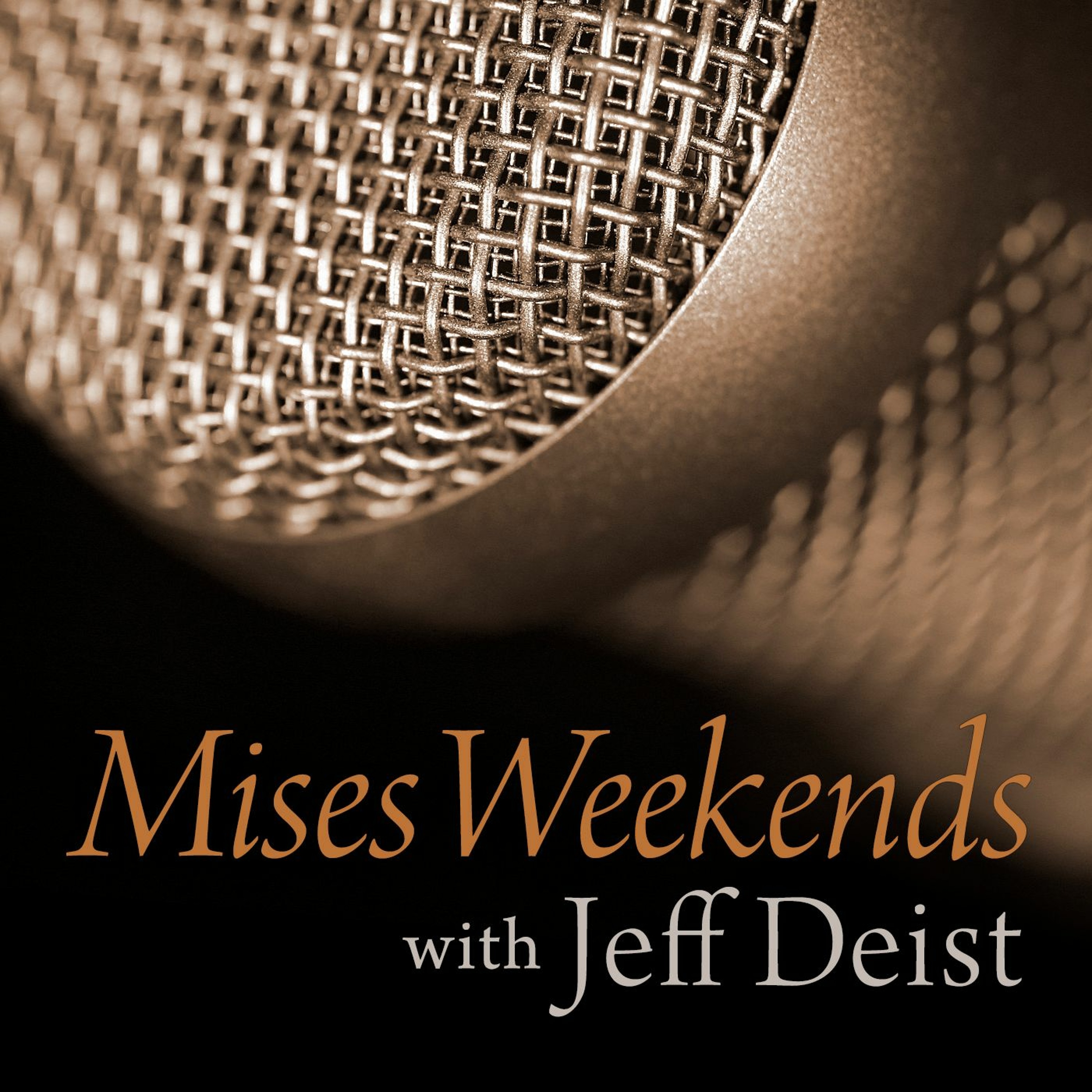 The Human Action PodcastDr. Mark Thornton: Central Bankers Don't Understand Booms and BustsOur guest this weekend is Dr. Mark Thornton, a senior fellow here at the Mises Institute, and our topic is booms and busts. Falling stock prices are in the news lately, so Mark and Jeff talk about how and why central bankers don't understand deflation, whether they are really Keynesians or some variant thereof, what a "crack-up boom" might look like, and what the Skyscraper Index and other forms of irrational spending might tell us about the future of the global economy.2016-01-2215 min
The Human Action PodcastDr. Mark Thornton: Central Bankers Don't Understand Booms and BustsOur guest this weekend is Dr. Mark Thornton, a senior fellow here at the Mises Institute, and our topic is booms and busts. Falling stock prices are in the news lately, so Mark and Jeff talk about how and why central bankers don't understand deflation, whether they are really Keynesians or some variant thereof, what a "crack-up boom" might look like, and what the Skyscraper Index and other forms of irrational spending might tell us about the future of the global economy.2016-01-2215 min Wall St For Main StRobert Murphy: Mistakes of 1929 Great Depression Being Repeated?Jason Burack of Wall St for Main St had on returning guest Austrian School Economist and author, Robert Murphy http://consultingbyrpm.com/blogRobert's bio and his Mises articles can be found here: https://mises.org/profile/robert-p-mu...Robert hosts the popular Contra Krugman podcast with Tom Woods that debunks each of Paul Krugman of the NY Times' articles: http://contrakrugman.com/Robert's many popular Austrian School of Economics books can be found here: http://www.amazon.com/Robert-P.-Murph...During this 35+ minute interview, Jason starts by asking Robert about the...2016-01-1300 min
Wall St For Main StRobert Murphy: Mistakes of 1929 Great Depression Being Repeated?Jason Burack of Wall St for Main St had on returning guest Austrian School Economist and author, Robert Murphy http://consultingbyrpm.com/blogRobert's bio and his Mises articles can be found here: https://mises.org/profile/robert-p-mu...Robert hosts the popular Contra Krugman podcast with Tom Woods that debunks each of Paul Krugman of the NY Times' articles: http://contrakrugman.com/Robert's many popular Austrian School of Economics books can be found here: http://www.amazon.com/Robert-P.-Murph...During this 35+ minute interview, Jason starts by asking Robert about the...2016-01-1300 min Wall St For Main StDr. Mark Thornton: Why Keynesians Have A Phobia For DeflationWall St for Main St welcome back Dr. Mark Thornton, who is a Austrian economist and Senior Fellow at the Mises Institute. In this podcast, we discussed the differences between Keynesian economic and Austrian economic on deflation, interest rates and the boom/bust cycle. Find out why the government and central banks fear and loathe deflation! 2015-11-1600 min
Wall St For Main StDr. Mark Thornton: Why Keynesians Have A Phobia For DeflationWall St for Main St welcome back Dr. Mark Thornton, who is a Austrian economist and Senior Fellow at the Mises Institute. In this podcast, we discussed the differences between Keynesian economic and Austrian economic on deflation, interest rates and the boom/bust cycle. Find out why the government and central banks fear and loathe deflation! 2015-11-1600 min Wall St For Main StDr. Joseph Salerno: Another Major Bust Coming SoonJason Burack of Wall St for Main St had on first time guest, Professor of Economics at Pace University, Academic VP of the Mises Institute https://mises.org/ and author of Money: Sound & Unsound, Dr. Joseph Salerno https://mises.org/profile/joseph-t-sa...During this 40+ minute discussion, Jason asks Dr. Salerno about the difference between the Austrian School of Economics, Keynesian Economics, Monetarism and Marxism. Dr Salerno summarizes these economic schools. Next, Jason asks Dr. Salerno, which Austrian School of Economics books beginners who are curious should start with?Jason then asks...2015-10-2600 min
Wall St For Main StDr. Joseph Salerno: Another Major Bust Coming SoonJason Burack of Wall St for Main St had on first time guest, Professor of Economics at Pace University, Academic VP of the Mises Institute https://mises.org/ and author of Money: Sound & Unsound, Dr. Joseph Salerno https://mises.org/profile/joseph-t-sa...During this 40+ minute discussion, Jason asks Dr. Salerno about the difference between the Austrian School of Economics, Keynesian Economics, Monetarism and Marxism. Dr Salerno summarizes these economic schools. Next, Jason asks Dr. Salerno, which Austrian School of Economics books beginners who are curious should start with?Jason then asks...2015-10-2600 min The Peter Schiff Show PodcastDon’t Expect a Normal Reaction to an Abnormal Situation – Video Blog
* On Friday we finally got the Non-Farm Payroll numbers for July
* The consensus is that this reports indicates that an interest rate hike is inevitable
* This is the rate hike that everybody has been expecting and this report see
* The report is weak, relative to previous months, but slightly ahead of the consensus
* It seems like we are going in the wrong direction
* Labor Force Participation Rate is stagnant at the lowest in decades
* Q2 GDP was much lower than expected
* the Atlanta GDP Now Forecast for Q3 at 1% - a third...2015-08-1124 min
The Peter Schiff Show PodcastDon’t Expect a Normal Reaction to an Abnormal Situation – Video Blog
* On Friday we finally got the Non-Farm Payroll numbers for July
* The consensus is that this reports indicates that an interest rate hike is inevitable
* This is the rate hike that everybody has been expecting and this report see
* The report is weak, relative to previous months, but slightly ahead of the consensus
* It seems like we are going in the wrong direction
* Labor Force Participation Rate is stagnant at the lowest in decades
* Q2 GDP was much lower than expected
* the Atlanta GDP Now Forecast for Q3 at 1% - a third...2015-08-1124 min The Peter Schiff Show PodcastWorst Recovery Since WWII Just Got Worse – Ep. 99
* This morning we got the first look at Q2 GDP
* Q1 had been reported most recently at -.2
* Everybody was looking for an upward revision due to the double seasonal adjustments
* The revision brought Q1 into the black, but only by .6
* Q2 expectation was 2.9; instead it came in at 2.3
* I had mentioned that at best, Q2 GDP would be in the low 2's, which is what we have
* After revisions, however, we could end up at below 2 for Q2
* Wall Street and the Fed were too optimistic about Q2
* Now previous...2015-07-3121 min
The Peter Schiff Show PodcastWorst Recovery Since WWII Just Got Worse – Ep. 99
* This morning we got the first look at Q2 GDP
* Q1 had been reported most recently at -.2
* Everybody was looking for an upward revision due to the double seasonal adjustments
* The revision brought Q1 into the black, but only by .6
* Q2 expectation was 2.9; instead it came in at 2.3
* I had mentioned that at best, Q2 GDP would be in the low 2's, which is what we have
* After revisions, however, we could end up at below 2 for Q2
* Wall Street and the Fed were too optimistic about Q2
* Now previous...2015-07-3121 min Wall St For Main StDr. Murray Sabrin: Federal Reserve Created a Ponzi SchemeJason Burack of Wall St for Main St had on first time guest, finance professor, Austrian School Economist and US Senate candidate, Murray Sabrin, http://murraysabrin.com/Murray has a number of good documentaries out about taxation and the Federal Reserve available for free on You Tube. During this 30+ minute interview, Jason asks Murray about his background and how he found the Austrian School of Economics? Murray says he found Austrian School Economics by accident while on an airplane. He saw an article by Murray Rothbard about President Nixon's wage and prices controls in...2015-07-0100 min
Wall St For Main StDr. Murray Sabrin: Federal Reserve Created a Ponzi SchemeJason Burack of Wall St for Main St had on first time guest, finance professor, Austrian School Economist and US Senate candidate, Murray Sabrin, http://murraysabrin.com/Murray has a number of good documentaries out about taxation and the Federal Reserve available for free on You Tube. During this 30+ minute interview, Jason asks Murray about his background and how he found the Austrian School of Economics? Murray says he found Austrian School Economics by accident while on an airplane. He saw an article by Murray Rothbard about President Nixon's wage and prices controls in...2015-07-0100 min The Peter Schiff Show PodcastDo the Swiss Envy Canadians Paying Higher Prices? – Ep 77
* S&P and the NASDAQ made new record highs
* Stock market continues to ignore all the bad news about the economy
* Bad news is not being ignored in the foreign exchange markets
* Negative economic news is buoying the stock market because it removes fear of interest rate hikes
* Weak economy means more cheap money which means higher stock prices
* Oil prices hitting highest prices of the year
* Gold is back above the 1200 level
* April PMI Manufacturing Flash Index at 54.2 biggest miss ever
* New Home Sales tumbled by 11.1% - biggest drop since...2015-04-2720 min
The Peter Schiff Show PodcastDo the Swiss Envy Canadians Paying Higher Prices? – Ep 77
* S&P and the NASDAQ made new record highs
* Stock market continues to ignore all the bad news about the economy
* Bad news is not being ignored in the foreign exchange markets
* Negative economic news is buoying the stock market because it removes fear of interest rate hikes
* Weak economy means more cheap money which means higher stock prices
* Oil prices hitting highest prices of the year
* Gold is back above the 1200 level
* April PMI Manufacturing Flash Index at 54.2 biggest miss ever
* New Home Sales tumbled by 11.1% - biggest drop since...2015-04-2720 min The Peter Schiff Show PodcastInflation Is The One Promise Central Banks Can Deliver – Ep 76
* Markets have been volatile but economic data still looking bad
* Chicago Fed National Activity Index: contrary to expectations, came in at -.42 in addition a downward correction for last week to a 2-year low
* Weekly Redbook Same Store Sales Survey down to lowest annual increase in 4 years with a dramatic rate of decline in recent months
* Implausible excuses, such as the weather or the timing of Easter, attempt to mask the fact that the economy is just weak
* Oil prices moved above $57, forming a sizable W-bottom
* Canadian dollar up about 5%
* Canadian inflation, especially...2015-04-2220 min
The Peter Schiff Show PodcastInflation Is The One Promise Central Banks Can Deliver – Ep 76
* Markets have been volatile but economic data still looking bad
* Chicago Fed National Activity Index: contrary to expectations, came in at -.42 in addition a downward correction for last week to a 2-year low
* Weekly Redbook Same Store Sales Survey down to lowest annual increase in 4 years with a dramatic rate of decline in recent months
* Implausible excuses, such as the weather or the timing of Easter, attempt to mask the fact that the economy is just weak
* Oil prices moved above $57, forming a sizable W-bottom
* Canadian dollar up about 5%
* Canadian inflation, especially...2015-04-2220 min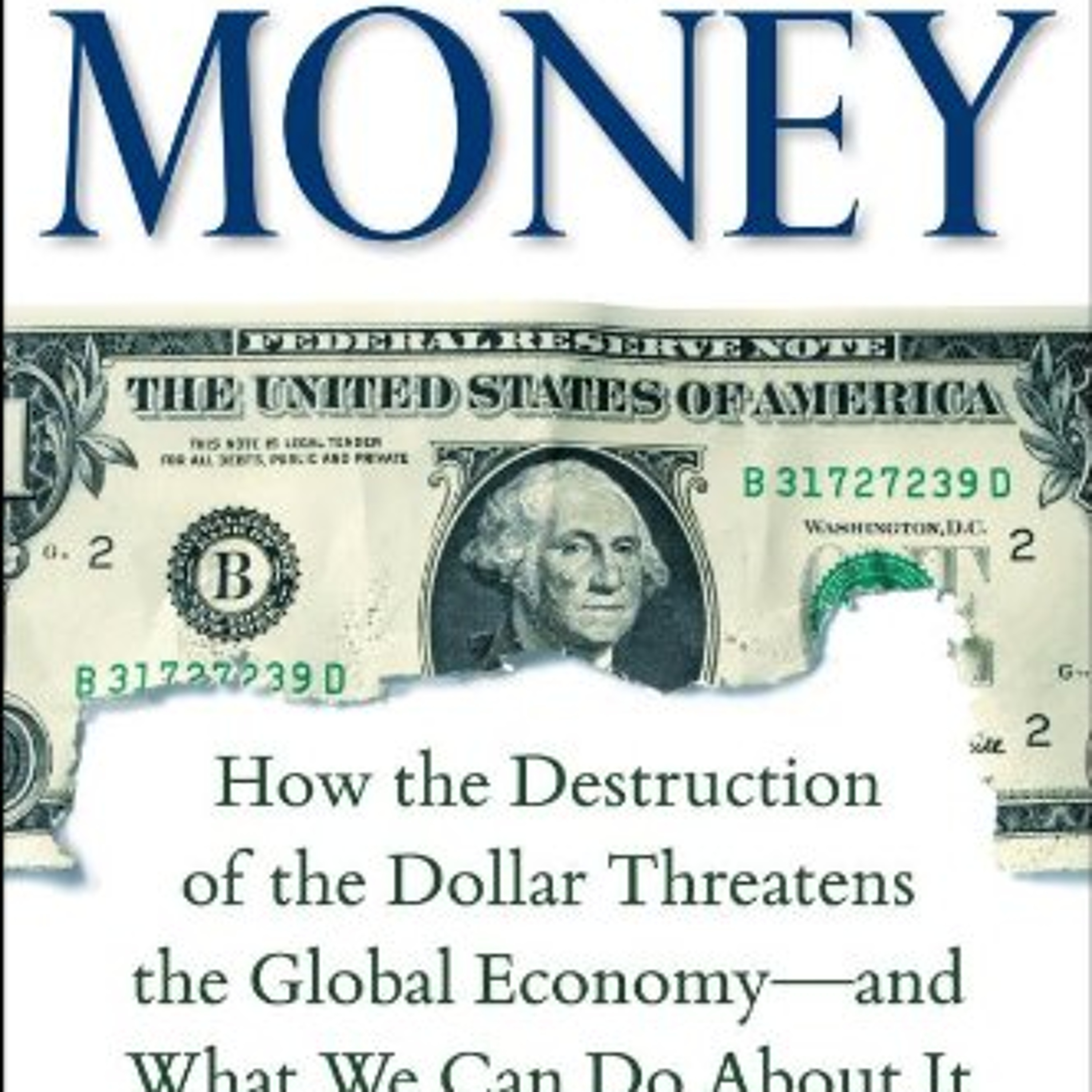 TheBlaze BooksSteve Forbes Interview re: "Money"Steve Forbes, chairman and editor-in-chief of Forbes Media, speaks with Ben Weingarten of TheBlaze Books on his new book, "Money: How the Destruction of the Dollar Threatens the Global Economy--and What We Can Do About It," the gold standard, the link between sound money and stable society, the Fed's economic mercantilism, the "fraud" that is modern economics, Forbes' challenge to Keynesians like Paul Krugman, Forbes' outlook for the American economy and much more.2014-09-0423 min
TheBlaze BooksSteve Forbes Interview re: "Money"Steve Forbes, chairman and editor-in-chief of Forbes Media, speaks with Ben Weingarten of TheBlaze Books on his new book, "Money: How the Destruction of the Dollar Threatens the Global Economy--and What We Can Do About It," the gold standard, the link between sound money and stable society, the Fed's economic mercantilism, the "fraud" that is modern economics, Forbes' challenge to Keynesians like Paul Krugman, Forbes' outlook for the American economy and much more.2014-09-0423 min From Alpha To Omega#010: Living Through The Monetarist ExperimentThis weeks guest is Philip Pilkington, a prolific economic contributor to the excellent ‘Naked Capitalism’ blog. 'Naked Capitalism' is one of the most visited economics blog on the web, featuring some of the top Political Economy bloggers on the planet. The show is loosely based around a series Philip wrote for the blog on Monetarism - the economic theories of Milton Friedman. We cover such rocky territory as the intellectual battles between the Keynesians and Monetarists, the Austrian School of Economics and Political Propaganda, Maggie Thatcher and class war, Union Busting and Military Coups, Finance vs Industry, and the return of t...2012-07-2058 min
From Alpha To Omega#010: Living Through The Monetarist ExperimentThis weeks guest is Philip Pilkington, a prolific economic contributor to the excellent ‘Naked Capitalism’ blog. 'Naked Capitalism' is one of the most visited economics blog on the web, featuring some of the top Political Economy bloggers on the planet. The show is loosely based around a series Philip wrote for the blog on Monetarism - the economic theories of Milton Friedman. We cover such rocky territory as the intellectual battles between the Keynesians and Monetarists, the Austrian School of Economics and Political Propaganda, Maggie Thatcher and class war, Union Busting and Military Coups, Finance vs Industry, and the return of t...2012-07-2058 min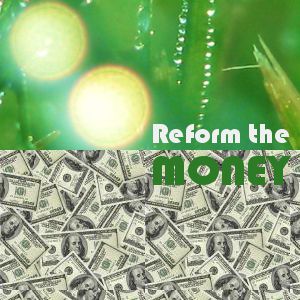 Reform the MoneyEllen Brown — Global Research News hour (MONDAY, NOVEMBER 23, 2009)GUEST: Ellen Brown is a civil litigation attorney, author, and frequent writer on financial matters. Her latest book, Web of Debt, is a brilliant analysis of the private banking cartel Federal Reserve, how it usurped money creation power, and how we can take it back.<br /><br />The Daily Bell, "A Compendium of Free-Market Thought," recently "awarded her a title all her own....Their are in (their) opinion, in modern economic thought, now Keynesians, Austrians and Brownians."<br /><br />Brown's latest writing will be discussed. <br /><br /><...2009-11-2235 min
Reform the MoneyEllen Brown — Global Research News hour (MONDAY, NOVEMBER 23, 2009)GUEST: Ellen Brown is a civil litigation attorney, author, and frequent writer on financial matters. Her latest book, Web of Debt, is a brilliant analysis of the private banking cartel Federal Reserve, how it usurped money creation power, and how we can take it back.<br /><br />The Daily Bell, "A Compendium of Free-Market Thought," recently "awarded her a title all her own....Their are in (their) opinion, in modern economic thought, now Keynesians, Austrians and Brownians."<br /><br />Brown's latest writing will be discussed. <br /><br /><...2009-11-2235 min Reform the MoneyEllen Brown — Global Research News hour (WEDNESDAY, OCTOBER 28, 2009)GUEST: Ellen Brown is a civil litigation attorney, author, and frequent writer on financial matters. Her latest book, Web of Debt, is a brilliant analysis of the private banking cartel Federal Reserve, how it usurped money creation power, and how we can take it back.<br /><br />The Daily Bell, "A Compendium of Free-Market Thought," recently "awarded her a title all her own....Their are in (their) opinion, in modern economic thought, now Keynesians, Austrians and Brownians."<br /><br />Brown's latest writing will be discussed. <br /><br /><...2009-10-2735 min
Reform the MoneyEllen Brown — Global Research News hour (WEDNESDAY, OCTOBER 28, 2009)GUEST: Ellen Brown is a civil litigation attorney, author, and frequent writer on financial matters. Her latest book, Web of Debt, is a brilliant analysis of the private banking cartel Federal Reserve, how it usurped money creation power, and how we can take it back.<br /><br />The Daily Bell, "A Compendium of Free-Market Thought," recently "awarded her a title all her own....Their are in (their) opinion, in modern economic thought, now Keynesians, Austrians and Brownians."<br /><br />Brown's latest writing will be discussed. <br /><br /><...2009-10-2735 min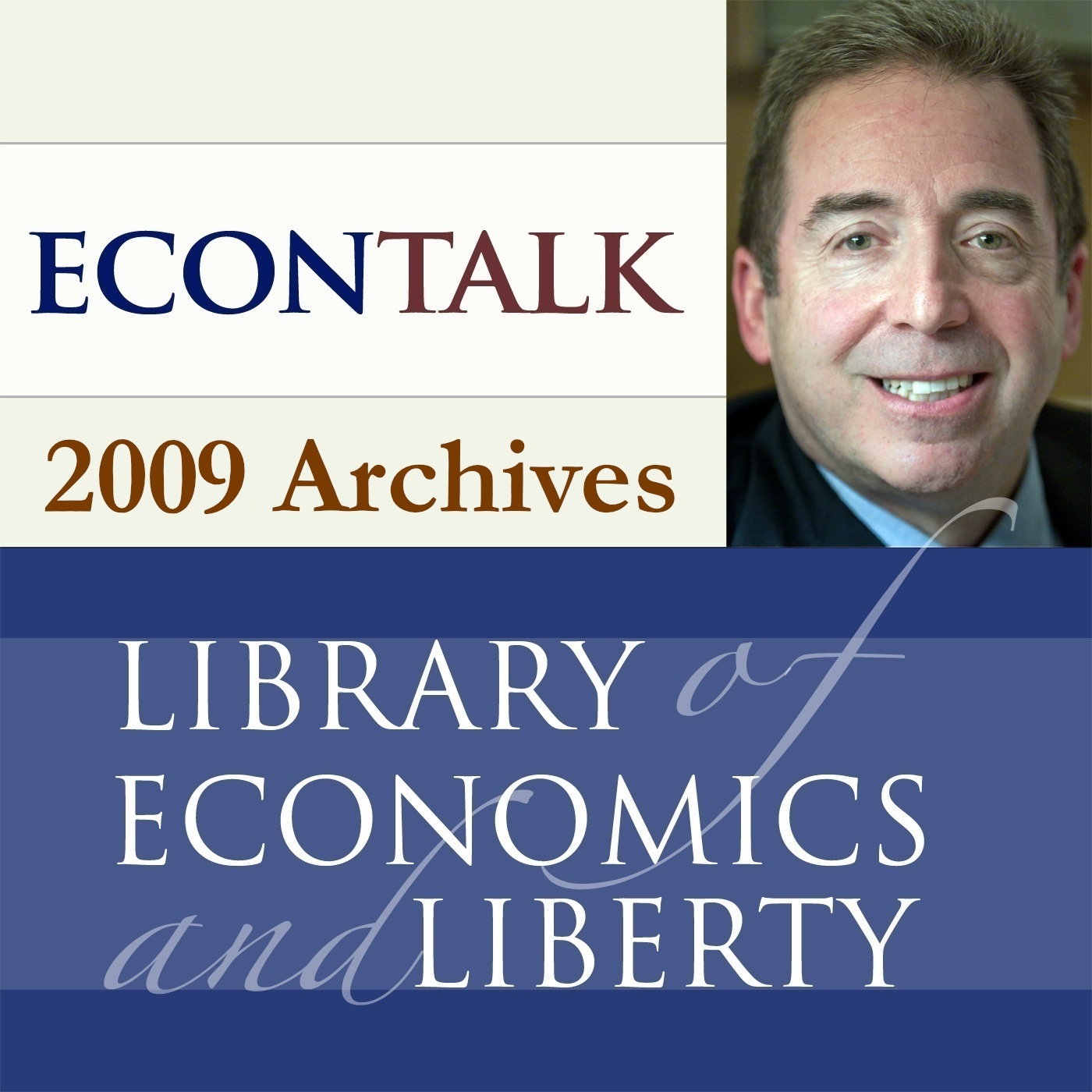 EconTalk Archives, 2009Reis on Keynes, Macroeconomics, and Monetary PolicyRicardo Reis of Columbia University talks with EconTalk host Russ Roberts about Keynesian economics in the classroom and in research. Reis argues that Keynesian models are a useful framework for helping undergraduates understand macroeconomic ideas of general equilibrium. More generally, Reis argues, Keynesian ideas remain influential in macroeconomic research, particularly among Neo-Keynesians. Reis discusses the lessons the economics profession and the world have learned from the Great Depression and suggests that those lessons have helped us manage the current crisis. The conversation closes with a discussion of whether economics is a science.2009-04-2700 min
EconTalk Archives, 2009Reis on Keynes, Macroeconomics, and Monetary PolicyRicardo Reis of Columbia University talks with EconTalk host Russ Roberts about Keynesian economics in the classroom and in research. Reis argues that Keynesian models are a useful framework for helping undergraduates understand macroeconomic ideas of general equilibrium. More generally, Reis argues, Keynesian ideas remain influential in macroeconomic research, particularly among Neo-Keynesians. Reis discusses the lessons the economics profession and the world have learned from the Great Depression and suggests that those lessons have helped us manage the current crisis. The conversation closes with a discussion of whether economics is a science.2009-04-2700 min EconTalkRicardo Reis on Keynes, Macroeconomics, and Monetary PolicyRicardo Reis of Columbia University talks with EconTalk host Russ Roberts about Keynesian economics in the classroom and in research. Reis argues that Keynesian models are a useful framework for helping undergraduates understand macroeconomic ideas of general equilibrium. More generally, Reis argues, Keynesian ideas remain influential in macroeconomic research, particularly among Neo-Keynesians. Reis discusses the lessons the economics profession and the world have learned from the Great Depression and suggests that those lessons have helped us manage the current crisis. The conversation closes with a discussion of whether economics is a science.
2009-04-271h 06
EconTalkRicardo Reis on Keynes, Macroeconomics, and Monetary PolicyRicardo Reis of Columbia University talks with EconTalk host Russ Roberts about Keynesian economics in the classroom and in research. Reis argues that Keynesian models are a useful framework for helping undergraduates understand macroeconomic ideas of general equilibrium. More generally, Reis argues, Keynesian ideas remain influential in macroeconomic research, particularly among Neo-Keynesians. Reis discusses the lessons the economics profession and the world have learned from the Great Depression and suggests that those lessons have helped us manage the current crisis. The conversation closes with a discussion of whether economics is a science.
2009-04-271h 06 EconTalk Archives, 2009Don Boudreaux on Macroeconomics and Austrian Business Cycle TheoryDon Boudreaux, of George Mason University, talks with EconTalk host Russ Roberts about the microfoundations of macroeconomics and the Austrian theory of business cycles. Boudreaux draws on Erik Lindahl's distinction between microeconomics and macroeconomics, emphasizing the difference between individual choices and the coordination of economic activity. Other topics include the Austrian view of capital and investment, the Austrian view of monetary policy, the issue of aggregation, and the intellectual successes of the Keynesians.2009-04-1300 min
EconTalk Archives, 2009Don Boudreaux on Macroeconomics and Austrian Business Cycle TheoryDon Boudreaux, of George Mason University, talks with EconTalk host Russ Roberts about the microfoundations of macroeconomics and the Austrian theory of business cycles. Boudreaux draws on Erik Lindahl's distinction between microeconomics and macroeconomics, emphasizing the difference between individual choices and the coordination of economic activity. Other topics include the Austrian view of capital and investment, the Austrian view of monetary policy, the issue of aggregation, and the intellectual successes of the Keynesians.2009-04-1300 min EconTalkDon Boudreaux on Macroeconomics and Austrian Business Cycle TheoryDon Boudreaux, of George Mason University, talks with EconTalk host Russ Roberts about the microfoundations of macroeconomics and the Austrian theory of business cycles. Boudreaux draws on Erik Lindahl's distinction between microeconomics and macroeconomics, emphasizing the difference between individual choices and the coordination of economic activity. Other topics include the Austrian view of capital and investment, the Austrian view of monetary policy, the issue of aggregation, and the intellectual successes of the Keynesians.
2009-04-131h 08
EconTalkDon Boudreaux on Macroeconomics and Austrian Business Cycle TheoryDon Boudreaux, of George Mason University, talks with EconTalk host Russ Roberts about the microfoundations of macroeconomics and the Austrian theory of business cycles. Boudreaux draws on Erik Lindahl's distinction between microeconomics and macroeconomics, emphasizing the difference between individual choices and the coordination of economic activity. Other topics include the Austrian view of capital and investment, the Austrian view of monetary policy, the issue of aggregation, and the intellectual successes of the Keynesians.
2009-04-131h 08